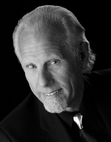Paul Bishop's Blog, page 20
December 13, 2017
RAFFERTY DOWN UNDER PART 2
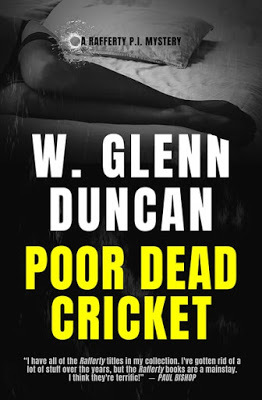
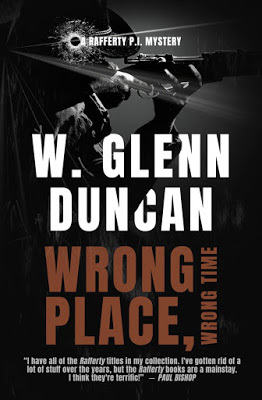
 RAFFERTY DOWN UNDER PART 2INTERVIEW WITH BILL DUNCAN
RAFFERTY DOWN UNDER PART 2INTERVIEW WITH BILL DUNCANIn Part 1 of Rafferty Down Under the illusive authorial fugitive W. Glenn Duncan was finally tracked down and brought in for questioning about his cult favorite private eye, Rafferty. Along the way we learned W. Glenn Duncan’s son, Bill Duncan, is not only republishing the original series of Rafferty novels, but has been writing Rafferty novels of his own, which are set to appear in 2018. Now it’s Bill’s turn under the bright lights of the interrogation room…
********Can you give us a brief biographical sketch of Bill Duncan?
Well, I was born at a very early age. Okay, that’s my one joke out of the way, and I promise to not to make any more. Maybe. Our family moved to Australia from the States when I was seven and I just did the usual kid things on both sides of the Pacific. Once here, we bounced around every couple of years—Mum and Dad always said they were gypsies at heart—even living on a farm for a few years.
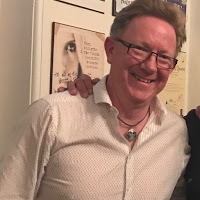 After school I went to University and graduated with degrees in Architecture. Spent the next 20 odd years working my way through various roles in the construction industry, and believe me, some of them were odd. I never really felt like I fit in anywhere. Maybe it was the writer bubbling away underneath trying to tell me something, maybe the gypsy genes, maybe a combination of both. Got married early, though the marriage didn’t last, and have two wonderful adult kids now.
After school I went to University and graduated with degrees in Architecture. Spent the next 20 odd years working my way through various roles in the construction industry, and believe me, some of them were odd. I never really felt like I fit in anywhere. Maybe it was the writer bubbling away underneath trying to tell me something, maybe the gypsy genes, maybe a combination of both. Got married early, though the marriage didn’t last, and have two wonderful adult kids now.Three truths and a lie about me:
At six months old, I had travelled more miles by air than by car.
Member of Mensa.
Have never fired a gun.
Once crashed a car into the top story of a two story house.
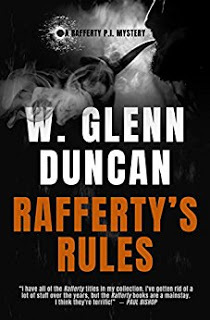 Were you a reader growing up? If so, what books did you enjoy?
Were you a reader growing up? If so, what books did you enjoy?Yeah, definitely. I read very early and Mum and Dad still love telling the story about me throwing my kindergarten teacher for a loop, resulting in them being called down to the school to be admonished, “You didn’t tell us he was a reader.”
I wish I had a great story about devouring The Collected Works of Tolkien by the time I was eight, and it being my springboard into the heady realms of writerdom but the truth is my tastes weren’t that exotic. As a young boy, I was drawn to true-life adventure—explorers, early pilots crossing oceans and undiscovered lands—that kind of thing. The first fiction I remember reading was a Hardy Boys book, and it lit a fire inside me. I devoured the series and loved every one of them.
Later on my reading spanned a few genres, mostly led by Dad’s reading tastes. Memorable reads from those times were Brian Lecomber’s work, Tales of the Black Widowers by Asimov, and Heinlein’s Tunnel in the Sky. There’s definitely a thread of adventure there, but what impacted me most was the humanity of the characters. What would they do? Why are they doing it? How far will a person go when pushed?
When did you realize your dad had written this series of cool detective books?
I was in high school when Dad retired from being a commercial pilot and turned his hand to writing. I remember the early days of him pounding away at the typewriter, but mainly I was trying to work out how I felt about being the only kid I knew whose father had a commercial photocopier at home. This is the eighties, remember.
I read a couple of the short stories he had published in AHMM and Mike Shayne and the first novel (non-Rafferty and unpublished) he wrote, and I remember the day when he told me Ballantine picked up Rafferty’s Rules. I was away at University when it was released so, though I knew what he was doing, I wasn’t close to it at the time. I was always proud to be able to tell my friends about my father, the published author, but I didn’t really understand the reach or the impact of the books until much later.
Did you read them immediately or did you rediscover them again later?
I read each book as they were released and have come back to them time and time again—as I tend to do with books I enjoy. Which probably explains why my TBR pile is still too tall for me to jump over.
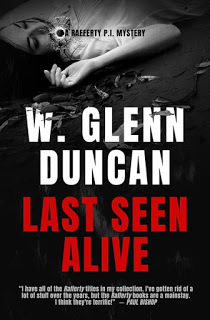 How did your dad feel about the Rafferty books?
How did your dad feel about the Rafferty books?I know he really enjoyed writing them—both the process and the result—but felt badly let down by the movie adaptation of Rafferty’s Rules. Having seen it, I have to agree with him. Dad has always been the kind of guy who would decide he was going to do something, and then just go get it done. I’m not sure if he realizes how big a deal it was to pick up writing as a new career and see the success his books had, but it’s been a huge inspiration to me as I look to follow a similar path.
When and why did you decide to revitalize the Rafferty books?
That decision was made in late 2016, after I’d already completed the first draft and a major rewrite of False Gods, and went hand in hand with my decision to indie publish. My original intention was to head down the traditional publishing route, and to target Dad’s old agent with my first query when the MS was ready.
In the end, what pushed me down the indie path was finding the online reactions to Rafferty, from people like you, Kevin Burton Smith, Bill Crider and Cliff Fausset. I knew from the words, and the obvious passion for the books, there was a market out there. I also realised it was unlikely a publishing house would be able to stop looking for the next ’69 Shades of the Girl with the Salamander Tattoo Gone on the Train’ blockbuster long enough to resurrect a few old PI books languishing on their backlist.
I figured, too, if there were fans from 30(!) years ago, then there were likely new fans who hadn’t caught up with Rafferty the first time around. So, Dad and I discussed the idea of revitalizing his books and he gave me the go ahead.
To test my theory about the publishing house, I floated a trial balloon past Ballantine, and Dad’s old agency, by approaching them for a rights reversion of Dad’s books, and telling them what I was planning to do. Neither of them blinked, they issued the reversion, and it saved me the hassle of writing a query letter.
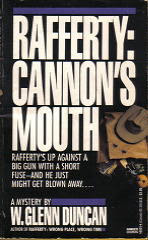 When did you make the decision to write a new Rafferty adventure?
When did you make the decision to write a new Rafferty adventure?In 2014, I suffered a deep bout of depression with the end result being I had to walk away from my previous career and business. As I was starting to come out the other side of the black cloud, I spent a lot of time thinking about how I could reinvent myself in a more sustainable way. I’d always been drawn to writing and dabbled with it from time to time—starting a novel and never carrying on with it, writing non-fiction pieces for business, and similar things—and long dreamed of writing full-time, but had never followed through.
At the same time, and probably because of where I was mentally, I thought a lot about legacy. In particular, what happens to the intangibles when we’re no longer here. Like Dad’s Rafferty books. It seemed a helluva shame all the work he’d done and the magic of his creation might just disappear with his passing. It didn’t seem fair and I decided to do what I could to make sure it didn’t happen.
In 2015, with those two things in mind, I knew this was my chance to see if I could do the work necessary to become a writer and I needed get my ass in gear and give it my best. Six months later I had completed first drafts of two 100,000 word novels. The second of those was False Gods.
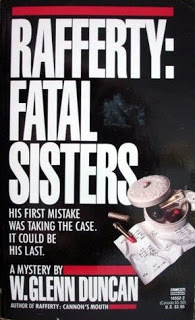 How did your discussion with your dad go when you said you wanted to continue his Rafferty series with the new novel False Gods?
How did your discussion with your dad go when you said you wanted to continue his Rafferty series with the new novel False Gods?He was really supportive, but tempered his enthusiasm with cautionary tales of the author as income-producing business. As far as the opportunity for Rafferty to hit the streets once again, he gave me carte blanche to do anything I wanted with the settings and the characters—move Rafferty to Australia, bring him into the 2000s, or anything I wanted to do.
I think he saw this as a way to make the new stories easier to write. However, one of the appeals of Rafferty has always been the voice of the time and place. I’m also an unabashed child of the 80s, so Rafferty remains—and will remain—a Dallas P.I. firmly rooted in the late 20th century.
Did your dad have any notes, partial manuscripts, or other story fragments for other Rafferty books?
There are no unpublished works. Mum and Dad moved several times since the nineties, so there weren’t even notes or compendiums for the published books. I rebuilt each one by scanning the actual mass-market paperbacks and compiling them from scratch. This process allowed me to get into the timelines of all the stories, confirm Rafferty’s rules (and their somewhat random numerical basis), the weapons he owns, and a bunch of other details. It was a great way for me to really inhabit Rafferty’s world, which I hope gives depth to the new books.
Have you written other fiction before Rafferty: False Gods?
I’ve written bits and pieces over the years, but the only fiction I’d ever finished was the first of those two novels I mentioned. It’s a book called Finding Karol and the archetypal first novel: highly cathartic, strived-for literary fiction, and self-compared to Jodi Picoult and Paul Theroux. It got some traction with Australian agents, but didn’t get across the line to a deal, and is currently in hiding on my hard drive.
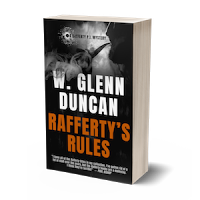 How did you learn the process to republish the Rafferty books?
How did you learn the process to republish the Rafferty books?Standing on the shoulders of giants was, and remains, the key. When I first started looking into the idea of indie publishing, I stumbled upon the writer/marketing site of Joanna Penn, which led me to the similar sites of Nick Stephenson and Mark Dawson. The three of them, and their generosity in sharing the lessons they’ve learned over years of trial-and-error, gave me the confidence I could make this work, and a lot of the blueprints to follow.
Your marketing plan is an example of doing things right. Do you have a background in marketing or learn on the fly?
Thanks for saying so. Obviously, I’ve got you fooled. It’s still very early days, but I feel like I’m on the right track. I’ve no formal background in marketing, so it really is learning on the fly. There’s a huge wealth of experience and opinions out there, with easier access than ever before. Not everything will work for everyone, so it’s important to assess with a critical eye and implement what seems to be the right thing for you and what you want to get out of your marketing. And if it doesn’t work the way you hoped, change until it does.
If you are flying by the seat of your pants in the publishing world (like many of us) what lessons have you learned from your experiences?
There’s a few...
Trust your gut— I knew that there was a new life for Rafferty and that the stories would resonate with, and entertain, both existing and new fans. The feedback I’ve already had has proven this was the right call.
Stick to your values— I’m pretty pedantic. Bill’s Rule #1: Any job worth doing is worth overdoing. Levity aside, making your work the best it can be is the writer’s side of the contract with readers. Great covers, professional editing, and thorough research is every bit as important as good storytelling.
It’s not life or death— Notwithstanding the above, it’s easy to get bound up in trying to make everything perfect. It never will be. Neither will any minor error be a catastrophic disaster that stops you dead. Do the best you can with what you have to hand at the time, move on, and try to do a little better tomorrow.
This is the best time in history to be a writer— We have access to unprecedented technology allowing us, as individuals, to run global businesses with a laptop and an internet connection. The barriers to entry have never been lower, so grab the opportunity with both hands and run like hell.
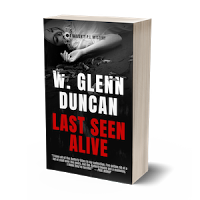 What’s the next case for Rafferty?
What’s the next case for Rafferty?False Gods will be out in 2018. I’ve already drafted book #8, with the working title of Blood Angels—however, I’m a little concerned about the repetitive religious language so the title may change. I’m currently working through the manuscript edits. At this point, I’m aiming to also release it in 2018.
Down the track, I’ll also being playing with different versions of all the books—paperbacks, audiobooks, boxsets, and who knows what else. Beyond that point, I’ve got nearly a dozen written what ifs ready to be explored, and I’m sure many more will emerge out of the ether. Whether they all grow in to full Rafferty books is yet to be seen, but I won’t know until I pitch myself into their rabbit-holes. February 2018 is my due date to pull one out of the pile and get started on a new exploration and see where it takes me.
What I do know is that I’ve had an absolute ball on the journey so far. It’s been a great thing for Dad too, to finally get to see the impact of his books on readers, something that wasn’t available to him during his run with the traditional publishing industry. So, I’m up for continuing the ride, if you are. Jump in and ride shotgun with me in this rusted, duct-taped, ’67 Mustang and let’s hit the streets.
*****
Thanks to W. Glenn Duncan and Bill Duncan for making the effort and taking the time to answer some long held questions about the Rafferty series and to fill us in on plans for Rafferty’s future...
TO VISIT THE
RAFFERTY P. I. WEBSITE
CLICK HERE
TO LEARN MORE ABOUT THE RAFFERTY SERIES ON THE THRILLING DETECTIVE WEBSITE CLICK HERE
THE RAFFERTY SERIESRafferty's Rules (1987)Last Seen Alive (1987)Poor Dead Cricket (1988)Wrong Place, Wrong Time (1989)Cannon's Mouth (1990)Fatal Sisters (1990)COMING SOONFalse Gods (2018)

Published on December 13, 2017 12:11
December 12, 2017
RAFFERTY DOWN UNDER PART 1
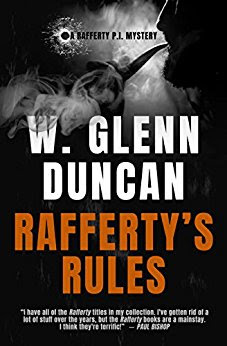
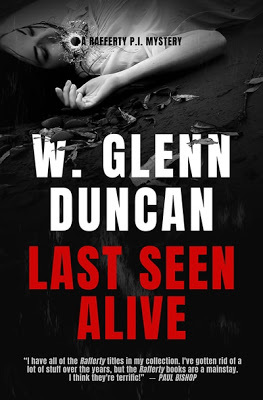
 RAFFERTY DOWN UNDER• PART 1 •
RAFFERTY DOWN UNDER• PART 1 •Somewhere, jockeying for position in my top five favorite tough guy private eyes, you will find the six book Rafferty series by Shamus Award winning author W. Glenn Duncan. Like author John Whitlatch, who I previously posted about, W. Glenn Duncan has been an enigma to his fans for many years. A former journalist and pilot, Duncan lived in Iowa, Ohio, Florida, Texas, and California, before disappearing into the proverbial wilds of Australia with his wife and three children.
Since the 1990 publication of the last Rafferty book, Fatal Sisters, a hardcore cult of mystery fans has grown around the paperback original Rafferty series. Whenever knowledgeable hardboiled gurus talk about favorite, overlooked, or forgotten private eye series, Rafferty is always mentioned at the highest levels.
The Rafferty series has been compared to both Robert B. Parker’s Spenser novels, which began a few years prior to the first Rafferty book, but had not yet become the bestselling phenomenon it is today. Robert Crais’ Elvis Cole premiered the same year as Rafferty’s Rules and also found itself being compared to the Spenser formula. Other series, including Harlan Coben’s Myron Bolitar books, followed a similar pattern.
The Rafferty series, however, broke away from the pack to establish its own original niche in the pantheon of great private eyes. The series became known not only for the spot on philosophy of the frequent quoting of Rafferty’s rules, but also for the great interplay between the tougher than tough Rafferty and his even tougher sidekick, Cowboy. Tougher than both of them, though, is Cowboy’s wife—the delightfully height challenged, Mimi. Each of the Rafferty books had an added depth of social conscious, dealing with problems that are still pertinent today.
Attempts have been made to trace Duncan for interviews or simply to find out more information about the author and his series—all eventually running into a dead end down under. Casual and in-depth Internet searches fail to provide any extensive or definitive information. Most recently, Lee Goldberg’s Brash Books tried to locate Duncan to obtain the reprint rights to the Rafferty series. Those efforts also ran aground on the coast of Austrailia and the search eventually abandoned.
When I wrote my original blog post on the enigmatic John Whitlatch in 2009, it prompted an unexpected response from an individual who had worked with Whitlatch in the insurance industry. When I reached out to the respondent, he provided me with a wealth of information on Whitlatch, which was previously unknown to genre mavens. I wrote and posted an article to document the details, causing a minor Internet run on used copies of Whitlatch’s novels—likely inflating prices by a few bucks for those late to the party.
Recently, I experienced a similar out of the blue response to a blog post I’d written regarding my admiration for the Rafferty series. Bill Duncan, son of W. Glenn Duncan contacted me to ask if he could quote my blog post as he was preparing to relaunch his father’s Rafferty novels in e-book format. The relaunch of the Rafferty series was great news, but I was also excited when Bill told me he was also taking over the reins of the Rafferty series, writing a new adventure—False Gods—which is great news for new readers and long term fans.
Bill graciously agreed to pass some specific questions on to his father related to the Rafferty series, and to also answer some questions himself about the upcoming Rafferty reissues and the soon to be released new Rafferty novel...
******INTERVIEW WITH W. GLEN DUNCAN
What can you tell us about your background, your reading interests, and how you began writing?
I was an avid reader growing up and read anything I could get my hands on. Studied journalism briefly in college before serving in the US Navy. After getting out, I went back to journalism and worked as a radio reporter in Dallas in the first half of the sixties. The whole job was being out and about, talking to and observing people. Dallas was a busy town. There was always something going on. And I had a car and could go anywhere I wanted to get a story. I was like a kid with a doughnut.
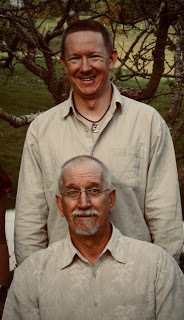 In 1964, I was inside the Neiman-Marcus building as it burned in the famous five-alarm fire, and I was the only reporter there. Everyone else was too chickenshit to come inside. Stanley Marcus, the store’s namesake was there too, and every five minutes he’d jump on the mic to say, “We’ll be open tomorrow morning at 8am for business.”
In 1964, I was inside the Neiman-Marcus building as it burned in the famous five-alarm fire, and I was the only reporter there. Everyone else was too chickenshit to come inside. Stanley Marcus, the store’s namesake was there too, and every five minutes he’d jump on the mic to say, “We’ll be open tomorrow morning at 8am for business.”I learned from that situation that the best thing to do was to get to someone who’s close to the story, and let them tell you the story. There’s an enormous vat of interesting stories in everyday interactions if you’re aware. If your ears are good enough, your pen can be good enough too.
What type of books do you enjoy reading and was there any book in particular that inspired you to begin writing?
No one book in particular inspired me, but I’ve always liked mysteries, adventure and aviation-related stories. Writers I’ve enjoyed reading are Wilbur Smith, John D. Macdonald, Stephen King and Robert B Parker.
Did you do any other writing before the Rafferty series or did you jump right into writing Rafferty’s Rules?
Rafferty was the third full-length novel I’d written. The previous two weren’t published. I did have a handful of short stories published...
It Could Happen to AnybodyMike Shayne
Mystery Magazine
Sept 1983Wally the DumbAlfred Hitchcock’s
Mystery Magazine
April 1984The Gray MercedesMike Shayne
Mystery Magazine
July 1984Alone at SeaAlfred Hitchcock’s
Mystery Magazine
Sept 1984
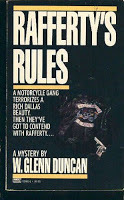 Did you use an agent to sell the Rafferty series or did you go directly over the transom to the publisher?
Did you use an agent to sell the Rafferty series or did you go directly over the transom to the publisher?Used an agent. Weirdly, though, it was an agent I hadn’t queried. I received a note from an intern, or assistant, who’d pulled Rafferty out of the slush pile at the agency where she worked and read it in her own time. She got in touch and told me the manuscript wouldn’t go anywhere at her agency, but she enjoyed it. However, she also thought it was the type of thing another agent she knew was looking for, and suggested I contact him.
Did you plan for Rafferty to become a series character or did you write Rafferty’s Rules as a standalone and the publisher asked for more?
Rafferty was written originally as a standalone, but it was a helluva lot of fun seeing where the characters took me in the subsequent books.
The Rafferty books were some of the last titles to be published under Fawcett’s iconic Gold Medal imprint. Were you aware of the storied Gold Medal history when you were being published by them?
Not really.
Did Gold Medal contract for the full series or go from book to book?
They took Rafferty’s Rulesfirst, then did a two-book deal for Last Seen Alive and Poor Dead Cricket, then a three-book deal for Wrong Place, Wrong Time, Cannon’s Mouth, and Fatal Sisters.
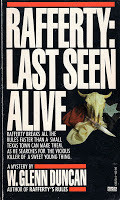 Did the Gold Medal choose not to continue the series after Fatal Sisters (Rafferty #6) or did you choose not to continue because of other demands on your time?
Did the Gold Medal choose not to continue the series after Fatal Sisters (Rafferty #6) or did you choose not to continue because of other demands on your time?When I finished writing Fatal Sisters, I had written six books in four years and I was ready for a break. Fawcett had also refused any new Rafferty stories due to declining sales, so I decided to take some well-earned down time.
My youngest daughter had moved out of the house, Val and I were enjoying being kid-free again, and my passion for sailing had grown to the point where I was refitting sailing boats and we were taking months-long cruises up and down the East Coast of Australia. By the time I was ready to get stuck back into Rafferty, the movie had been released. I was so disappointed with what they’d done, I decided to stop there and then. I always believed when it stops being fun, it’s time to stop. And it was.
Were you surprised to win the Shamus Award for Rafferty’s Rules?
Yes, very. And flattered.
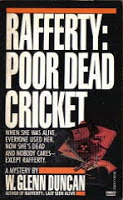 Did you socialize with other writers’ groups such as Mystery Writers of America or Private Eye Writers of America?
Did you socialize with other writers’ groups such as Mystery Writers of America or Private Eye Writers of America?No. This was the mid to late eighties, and Australia might has well have been on another planet, as far as communication was concerned. All correspondence between the agent and me was still by typewritten letter!
How did Rafferty’s Rules come to be sold as the basis for the Lorenzo Lamas action film, Snake Eater III—His Law?
The film production company expressed interest in securing a film option to Rafferty’s Rules in the late eighties. ’88, ’89, somewhere around there. I don’t remember if they approached my agent or if it was the other way around. It took forever to reach an agreement on the contract. With 20/20 hindsight, maybe I should have known it would turn out the way it did.
The production company originally said that they wouldn’t use Rafferty’s Rules as the basis for a Snake Eater film, but in ’91 they exercised their option and, unfortunately, we all know what happened afterward.
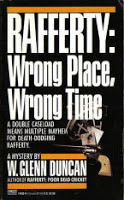 Did you have any other involvement in making the movie?
Did you have any other involvement in making the movie?Hell, no. Does it look like it? I sincerely hope not. Truth be told, although I’ve always been a proponent of the “Take the money and run” approach for Hollywood enquiries, the complete disaster the movie became is a solid argument for getting involved.
A lack of information from my agent on exactly how the story would be used also factored into my hands-off approach. If I’d known how much they were going to screw it up, I would have fought for Rafferty.
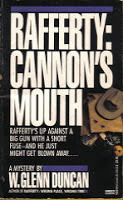 What prompted you to move to Australia and was the move before, after, or in the middle of writing the Rafferty books?
What prompted you to move to Australia and was the move before, after, or in the middle of writing the Rafferty books?We moved to Australia in 1975 after watching the debacle that the US government had become with Nixon and the Watergate affair. We wanted to give the kids a better place to grow up and Australia reminded us a lot of the way the US used to be.
Were you ever aware genre fans and publishers were trying to track you down?
Honestly had no idea until Bill told me what he’d found in speaking to you and a few of the other contacts he’d made. We’d been living aboard a boat for 15 years too, mostly away from any sort of public life and far, far away from the internet. The whole idea of social media (what the hell is that, anyway?) and having an online “presence” bores me to tears.
Have you continued to write while down under?
After Rafferty finished, I wrote a few articles for boating magazines.
Have you read any of the Australian crime writers?
I enjoy both Peter Corris and Jon Cleary.
How do you feel about Rafferty making a comeback under the guidance of your son, Bill?
I think it’s great that Bill is repubbing my books, and it’s hard to believe there are still people out there who want to read those old things, but the most exciting part is to know that Bill is writing his own instalment. Really looking forward to the release of False Gods.
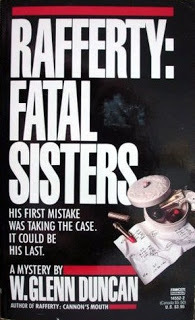 Why does Rafferty remains a cult favorite among hardboiled fans?
Why does Rafferty remains a cult favorite among hardboiled fans?Wow, I really don’t know. All I can say is that I had a helluva lot of fun writing each story and I guess that probably comes through in the reading. It surprises me that they seem to have stood the test of time, but I believe it’s all down to the relatability of the characters, which was the easy part. Once I got started, the characters and the situations they found themselves in would tell me what they wanted to do next. I just let them be themselves and didn’t force them anywhere.
Cowboy and Mimi were my favorites. Nobody had ever written a couple like that before and I thought it would be fun to see what happened with them. It was. And though mysteries and crime are easy to make plot-driven, I always wanted the characters to be the central focus. There’s no point in telling the reader what happens next when I can show them by making the characters do things that move the action along.
You’ve got to keep the reader interested, and I hope the stories did that. In Last Seen Alive, where Boat blows up (Ed: Spoiler alert) there was no reason to have Jim Belker and his daughter in the scene. But by including the realistic scenario of a father and daughter on a quiet fishing trip nearby, I could increase the drama and tension and get the reader more invested in what’s happening.
******Thanks to W. Glenn Duncan for the great conversation. In Part 2 of Rafferty Down Under, it’s time to bring Bill Duncan under the interrogation lamps and tell us about the bright future planned for the Rafferty series.
TO VISIT THE
RAFFERT P. I. WEBSITE
CLICK HERE
TO LEARN MORE ABOUT THE RAFFERTY SERIESON THE THRILLING DETECTIVE WEBSITE CLICK HERE
THE RAFFERTY SERIESRafferty's Rules (1987)Last Seen Alive (1987)Poor Dead Cricket (1988)Wrong Place, Wrong Time (1989)Cannon's Mouth (1990)Fatal Sisters (1990)
COMING SOONFalse Gods (2018)
RAFFERTY AND THE MOVIES
In 1989, looking to capitalize on his martial arts skills, pretty boy Lorenzo Lamas tried to make the jump from a secondary character on the television prime time soap opera Falcon Crest, to big screen action movie star. Unfortunately, his choice for his first action role was the disasterous low budget B-movie, Snake Eater. The plot played out like an entry in a by-the-numbers men’s adventure paperback series. As Jack Soldier Kelly, Lorenzo Lamas is the leader of the Snake Eaters, an elite division of the Marines especially trained for search and destroy missions. When Soldier finds out a band of backwoods bad-guys have killed his parents and abducted his sister, he returns home to extract kick-ass revenge.
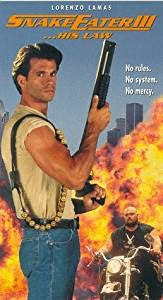 Somehow, Snake Eater spawned two sequels. Snake Eater II—The Drug Busterdid a hit and run on the big screen in 1989, almost immediately after the release of the original. In 1992, Snake Eater III—His Law completed the trilogy. There is one remarkable thing about Snake Eater III. While the first two Snake Eater entries were original screenplays, Snake Eater III was based on W. Glen Duncan’s novel Rafferty’s Rules—the first in his Rafferty series.
Somehow, Snake Eater spawned two sequels. Snake Eater II—The Drug Busterdid a hit and run on the big screen in 1989, almost immediately after the release of the original. In 1992, Snake Eater III—His Law completed the trilogy. There is one remarkable thing about Snake Eater III. While the first two Snake Eater entries were original screenplays, Snake Eater III was based on W. Glen Duncan’s novel Rafferty’s Rules—the first in his Rafferty series.From a glance at its synopsis, Snake Eater III—His Law would appear to follow at least the basic set-up of Rafferty’s Rules...Vietnam vet Jack Soldier Kelly is hired to find a biker gang called Hell's Fury and extract revenge on the outlaw bikers for the kidnapping, drugging, and rape of a young college co-ed. Even Rafferty’s partner in crime, the slightly psychotic Cowboy (portrayed by stunt coordinator Minor Mustain), gets name checked as an ex-biker turned private eye who teams up with Soldier.
Soldier even gets Rafferty’s love interest, Hildy Gardener (Canadian actress Tracey Cook). However, beyond a couple of well-choreographed martial arts scenes, the movie did the source material no favors.
Published on December 12, 2017 21:31
December 4, 2017
BRIT—WEST: WRANGLING WORDS WITH ANDREW MCBRIDE
 BRIT—WEST: WRANGLING WORDS WITH ANDREW MCBRIDE
BRIT—WEST: WRANGLING WORDS WITH ANDREW MCBRIDE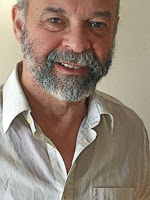 Andrew McBride is another of the stellar writer continuing the tradition of popular western novels written by British authors. Following in the tradition of J. T. Edson, Matt Chisholm, the Piccadilly Cowboys and others, Andrew has seen six of his Westerns published, all featuring Calvin Taylor as the central character. Happily, Andrew has taken the time to step out of the saddle and join us around the campfire for a chat...
Andrew McBride is another of the stellar writer continuing the tradition of popular western novels written by British authors. Following in the tradition of J. T. Edson, Matt Chisholm, the Piccadilly Cowboys and others, Andrew has seen six of his Westerns published, all featuring Calvin Taylor as the central character. Happily, Andrew has taken the time to step out of the saddle and join us around the campfire for a chat...********If it was tacked up in the Sheriff’s office, what information would be included on a Wild West wanted poster with your picture on it?
Andrew McBride. Aged about 63. Last seen in Brighton, England. Wanted for writing 6 published western novels: Canyon Of The Dead, Death Wears A Star, Death Song, The Arizona Kid, Shadow Man, and The Peacemaker.
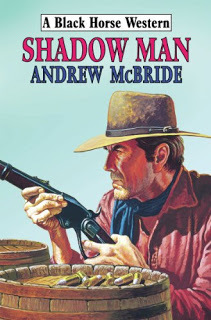 What was your introduction to Westerns—movies, TV, or books?
What was your introduction to Westerns—movies, TV, or books?TV. I made a schoolboy friend in 1967 and his family had the new TV channel BBC 2, so I used to go round to his house to watch. One of its signature shows was the new TV Western series The High Chaparral, which immediately impressed me with its grittiness, authenticity and location photography—I fell in love with the physical beauty of Southern Arizona. I’ve blogged about my appreciation for The High Chaparral. My latest western The Peacemaker is partly based on an episode of The High Chaparral. It’s my homage to the show, a mere 49 years later. The High Chaparral kicked off my love for Western movies, particularly those starring John Wayne and/or directed by John Ford.
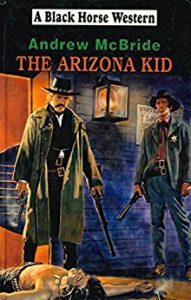 What was the first Western you read?
What was the first Western you read?I’m probably remembering this too neatly, but watching The High Chaparral with my schoolboy pal sparked an interest in Western history and Native American culture. He also got interested in the historical background to the show and was reading a novel called Broken Arrow, which was a junior version of Elliot Arnold’s great novel, Blood Brother. This is all about the great Apache chief Cochise. I read it and nearly half a century later finally wrote my own novel with Cochise in it—The Peacemaker. When I was in my early 20s, another pal turned me onto the McAllister westerns by Matt Chisolm and started me reading westerns regularly—people like Gordon Shirreffs, Will Henry, Fred Grove and Robert MacLeod.
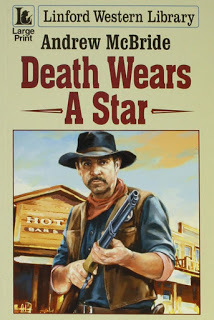 What was it about the genre you found compelling enough for you to want to write a Western?
What was it about the genre you found compelling enough for you to want to write a Western?I've always been drawn to adventure stories set outdoors. I can’t see myself writing an urban novel. I like having my characters tested by the struggle to survive in a wilderness. For me westerns ticked every box—they not only have conflict and action aplenty, but also strong dramatic tension because they’re essentially morality plays about the fight between right and wrong.
They deal with a broad range of moral dilemmas, which the settlement of the West intensified. How do you tame a wilderness without destroying it? How much violence is necessary—and how much is excessive—in creating a law-abiding society? How can diverse cultures—for example the white man and the Native Americans—co-exist? All of this is painted on a canvas of physical beauty and diversity.
There’s a lot of tragedy in Western history—what happened to the Native Americans, for example, and to the basic environment. It’s the stuff of high drama. There’s also beauty and poetry in the language, not only the laconic speak of everyday Westerners but even in real names—when I first read about the Alamo, and people called Travis, Crockett, Bowie, Santa Anna, and others, I was hooked!
Had you written books before, or was your first Western your literary debut?
My western Canyon Of The Dead was my literary debut. I’d written a couple of earlier books, which have yet to see the light of day—another western and a novel on the Arthurian legend. I’ve also written some contemporary thrillers since, but oddly enough, it’s the westerns, which I would have thought were the least commercial of my output, that have been published.
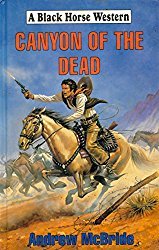 How do you see the current state of the Western genre?
How do you see the current state of the Western genre?I don’t really know. Based in Britain, I’d assumed Western publishing was pretty moribund—the only UK publishers I was aware of doing westerns was Robert Hale (since taken over by Crowood Press). But since starting on social media a year ago, I’ve become aware there’s a lot going on with Piccadilly Publishing and a bunch of publishers over in the States. So, it appears a lot healthier than I’d thought.
And despite being written off 40 years ago, Western movies and TV shows keep popping up and occasionally succeed. I can’t say I’ve been too impressed by most of the recent re-makes of classic movies. I haven’t gone for some of these hybrids either—Such as Cowboys and Aliens. I’d like to see an original Western film succeed on its merits—as Unforgiven did—not just because it’s some kind of whacky novelty. However, whilst I can’t see the Western ever coming back to the heights it commanded in the 1950s and ’60s, there seems to be plenty of life left in the old dog yet!
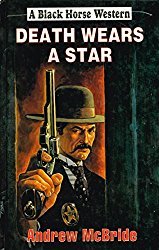 What was your journey to getting your first Western published?
What was your journey to getting your first Western published?In 1982, I submitted a western called Shadow Man to Robert Hale. They rejected it—quite rightly, as it wasn’t good enough. A dozen years later an author friend of mine—Philip Caveney—mentioned Hale were still looking for westerns. So, rather than writing a new one, I dug out Shadow Man from the bottom of a drawer, dusted off the cobwebs and looked at it again. I re-wrote about half of it, re-submitted it to Hale and they accepted it. The only problems was they had another book called Shadow Man coming out. I re-titled mine Canyon Of The Dead. It came out in 1996, 14 years late. As a sort of post-script, I later wrote another one for Hale—again called Shadow Man—and they published it in 2008. So, getting one form of Shadow Man out there took 26 years!
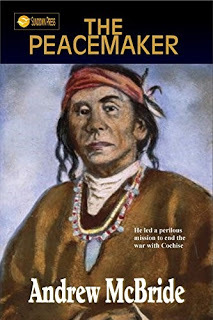 Have you been to the West, and if not, how do you do your research? Yes, I’ve been to the west, although not to some of the areas I write about. I think my first Western experience was when we were driving southwest from San Antonio, Texas, towards Mexico. San Antonio was great, but it seemed more southern and Mexican than Western. We stopped at a place called Cotulla, Texas, on the Nueces River. Getting out of the car, I suddenly felt the wind blowing warm desert heat and a peppering of dust on my skin. That’s when I knew I was in the West. To me the West starts with two things: When it gets empty, and there’s wide open spaces and big skies; and when it gets dry. But I don’t think you need to have been there to write about it. When he started writing westerns, Elmore Leonard, who wrote classics like Hombre, was living in the Midwest and had never been west of the Mississippi. As I’m interested in the history of the West, I’ve accumulated a library of reference books, such as The Old West Time Life series. And the internet is fantastic. If 20 years ago a Brit writing a western wanted to describe say, Apache Mountain Spirit Dancers, he’d have to go to his local library and hope they had a book about them—otherwise he’d have to order one and wait a month until it arrived. Now, in five minutes, you can Google Apache Mountain Spirit Dancers, read about them and watch a YouTube video of them.
Have you been to the West, and if not, how do you do your research? Yes, I’ve been to the west, although not to some of the areas I write about. I think my first Western experience was when we were driving southwest from San Antonio, Texas, towards Mexico. San Antonio was great, but it seemed more southern and Mexican than Western. We stopped at a place called Cotulla, Texas, on the Nueces River. Getting out of the car, I suddenly felt the wind blowing warm desert heat and a peppering of dust on my skin. That’s when I knew I was in the West. To me the West starts with two things: When it gets empty, and there’s wide open spaces and big skies; and when it gets dry. But I don’t think you need to have been there to write about it. When he started writing westerns, Elmore Leonard, who wrote classics like Hombre, was living in the Midwest and had never been west of the Mississippi. As I’m interested in the history of the West, I’ve accumulated a library of reference books, such as The Old West Time Life series. And the internet is fantastic. If 20 years ago a Brit writing a western wanted to describe say, Apache Mountain Spirit Dancers, he’d have to go to his local library and hope they had a book about them—otherwise he’d have to order one and wait a month until it arrived. Now, in five minutes, you can Google Apache Mountain Spirit Dancers, read about them and watch a YouTube video of them.
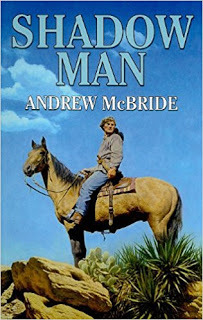 Is there any difference between Westerns written by British writer’s and Westerns written by homegrown American writers? I don’t think so, if they’re skillful enough to hide their Britishness. I’m a great fan of Elmore Leonard, but I noticed, reading some of his westerns, he’d get little facts wrong—names of plants etc. So, I wasn’t surprised to discover when he started writing westerns he was living in the Midwest and had never been west of the Mississippi. On the other hand, I read The Buffalo Soldiers by John Prebble and the McAllister westerns by Matt Chisolm and thought both authors had totally authentic American voices—so, I was pretty surprised to discover both were British. Do you currently read Westerns, and if so, who are your favorite Western authors? I’ve always read widely, not just Westerns, but I still read them. In the past, alongside the authors I’ve already mentioned, I read Jack Schaefer, Glendon Swarthout, Dorothy M. Johnson, Thomas Berger, Charles Neider, Louis L’Amour, Louis B. Patten, A. B. Guthrie jnr. etc. Since engaging with Facebook I’ve become aware of and FB friends with authors like J.R. Lindermuth, Robert Vaughan, and Ralph Cotton—all of whom were kind enough to give good reviews to The Peacemaker. I reviewed Ralph Cotton’s novel While Angel’s Dance, about the James Gang, and gave it 5 stars—which is a very rare thing for me to do. And there’s lots more I intend to check out. Do you have a writing mentor? I did have. I started reading out my stuff at writing groups in the 1980s. At one of them, a guy called Philip Caveney suggested I seriously consider writing for a living. That impressed me because he was the first person to take me seriously as a writer. I valued his opinion because he was also the first published author I’d met. He’s been successful writing thrillers and now children’s fiction. I reckoned he knew what he was talking about. So, it’s all his fault! I still go to a writing group, a small band who critique each other’s work. I think getting constructive criticism and positive (but not fawning) feedback is essential to mastering the nuts and bolts of how to write well.
Is there any difference between Westerns written by British writer’s and Westerns written by homegrown American writers? I don’t think so, if they’re skillful enough to hide their Britishness. I’m a great fan of Elmore Leonard, but I noticed, reading some of his westerns, he’d get little facts wrong—names of plants etc. So, I wasn’t surprised to discover when he started writing westerns he was living in the Midwest and had never been west of the Mississippi. On the other hand, I read The Buffalo Soldiers by John Prebble and the McAllister westerns by Matt Chisolm and thought both authors had totally authentic American voices—so, I was pretty surprised to discover both were British. Do you currently read Westerns, and if so, who are your favorite Western authors? I’ve always read widely, not just Westerns, but I still read them. In the past, alongside the authors I’ve already mentioned, I read Jack Schaefer, Glendon Swarthout, Dorothy M. Johnson, Thomas Berger, Charles Neider, Louis L’Amour, Louis B. Patten, A. B. Guthrie jnr. etc. Since engaging with Facebook I’ve become aware of and FB friends with authors like J.R. Lindermuth, Robert Vaughan, and Ralph Cotton—all of whom were kind enough to give good reviews to The Peacemaker. I reviewed Ralph Cotton’s novel While Angel’s Dance, about the James Gang, and gave it 5 stars—which is a very rare thing for me to do. And there’s lots more I intend to check out. Do you have a writing mentor? I did have. I started reading out my stuff at writing groups in the 1980s. At one of them, a guy called Philip Caveney suggested I seriously consider writing for a living. That impressed me because he was the first person to take me seriously as a writer. I valued his opinion because he was also the first published author I’d met. He’s been successful writing thrillers and now children’s fiction. I reckoned he knew what he was talking about. So, it’s all his fault! I still go to a writing group, a small band who critique each other’s work. I think getting constructive criticism and positive (but not fawning) feedback is essential to mastering the nuts and bolts of how to write well.
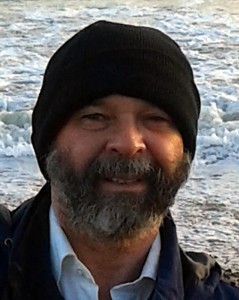 When you start writing a new Western, do you pick a standard Western plot (I think there are about six) and look for a way to turn it on its head, or do you look to history or some other source for inspiration? You can argue until the cows come home about how many basic plots there are to anything. I do think it’s better to try a new wrinkle on things rather than re-cycling clichés. Plotting’s not my greatest strength, so I often look to history for inspiration. Death Wears A Star was a fictionalization of the Earps in Tombstone story, and The Arizona Kid fictionalized Billy the Kid’s story. There was something of Lt. Howard Cushing—a cavalry officer who fought Apaches—in Death Song. I also have a friend I nickname Dr. Plot who’s good at helping me out when I get stuck about what happens next. Western author Thomas Rizzo, one of my Facebook friends, keeps a wonderful blog and almost daily posts little vignettes of historical frontier escapades. Anybody stuck for an idea for a novel only needs to visit his blog and they’d find material for 20 Westerns. Where do you stand of indy versus small press versus traditional publishing? I haven’t gone into it in depth, but if I had plenty of money and time, I might consider self-publishing. It cuts out the middle man, but I suspect it requires a huge amount of time and effort on social media and self-promotion just trying to attract an audience. For me, the best model is still a publisher who pays you a fair advance and does most of what we in Britain call the donkey work for you—e.g. promotion, advertising etc.—and leaves the writer to mostly write. It may be an increasingly impossible dream, but it’s what I hanker for. What is your latest Western and what are you currently writing? I have two novels with publishers—one about Robin Hood, and another western. I’m finishing up a project so different from what I normally do, I’m keeping very quiet about it. Sorry about the mystery. It wouldn’t fit the Andrew McBride canon, so I’d have to publish it under another name. I’ve started another western, which I hope to launch into properly by next February. It’s going to have an elegiac, Wild Bunch-y end of the West feel. That’s the plan anyway, but you know what Robbie Burns said about plans…[The best laid schemes o' Mice an' Men, Gang aft agley, An' lea'e us nought but grief an' pain, For promis'd joy]********Thx to Andrew for taking the time to chat. TO VISIT ANDREW ON THE WEB CLICK HERE
When you start writing a new Western, do you pick a standard Western plot (I think there are about six) and look for a way to turn it on its head, or do you look to history or some other source for inspiration? You can argue until the cows come home about how many basic plots there are to anything. I do think it’s better to try a new wrinkle on things rather than re-cycling clichés. Plotting’s not my greatest strength, so I often look to history for inspiration. Death Wears A Star was a fictionalization of the Earps in Tombstone story, and The Arizona Kid fictionalized Billy the Kid’s story. There was something of Lt. Howard Cushing—a cavalry officer who fought Apaches—in Death Song. I also have a friend I nickname Dr. Plot who’s good at helping me out when I get stuck about what happens next. Western author Thomas Rizzo, one of my Facebook friends, keeps a wonderful blog and almost daily posts little vignettes of historical frontier escapades. Anybody stuck for an idea for a novel only needs to visit his blog and they’d find material for 20 Westerns. Where do you stand of indy versus small press versus traditional publishing? I haven’t gone into it in depth, but if I had plenty of money and time, I might consider self-publishing. It cuts out the middle man, but I suspect it requires a huge amount of time and effort on social media and self-promotion just trying to attract an audience. For me, the best model is still a publisher who pays you a fair advance and does most of what we in Britain call the donkey work for you—e.g. promotion, advertising etc.—and leaves the writer to mostly write. It may be an increasingly impossible dream, but it’s what I hanker for. What is your latest Western and what are you currently writing? I have two novels with publishers—one about Robin Hood, and another western. I’m finishing up a project so different from what I normally do, I’m keeping very quiet about it. Sorry about the mystery. It wouldn’t fit the Andrew McBride canon, so I’d have to publish it under another name. I’ve started another western, which I hope to launch into properly by next February. It’s going to have an elegiac, Wild Bunch-y end of the West feel. That’s the plan anyway, but you know what Robbie Burns said about plans…[The best laid schemes o' Mice an' Men, Gang aft agley, An' lea'e us nought but grief an' pain, For promis'd joy]********Thx to Andrew for taking the time to chat. TO VISIT ANDREW ON THE WEB CLICK HERE
Published on December 04, 2017 12:19
November 23, 2017
BRIT—WEST: SIX-GUNS DOWN UNDER WITH BRENT TOWNS
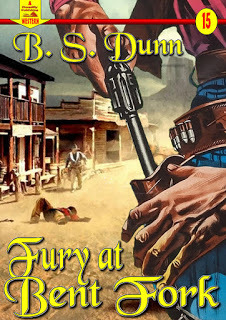
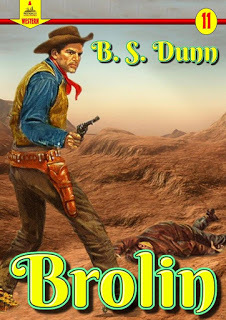 BRIT—WEST: SIX-GUNS DOWN UNDERWITH BRENT TOWNSThere’s a new wordslinger in town...or in this case, Towns. Much as the mean and dangerous British writers known as the Piccadilly Cowboys did in the ’70, writing uber-action filled westerns from the wilds of London (and surrounding environs), Brent Towns has recently exploded onto the stage of the western genre from a far distant land—Australia. With six-guns blazing from his key board, Brent has trigger fanned over a dozen top-notch westerns under his own name and a trio of wanted alias: B. S. Dunn, Jake Henry, and Sam Clancy.
BRIT—WEST: SIX-GUNS DOWN UNDERWITH BRENT TOWNSThere’s a new wordslinger in town...or in this case, Towns. Much as the mean and dangerous British writers known as the Piccadilly Cowboys did in the ’70, writing uber-action filled westerns from the wilds of London (and surrounding environs), Brent Towns has recently exploded onto the stage of the western genre from a far distant land—Australia. With six-guns blazing from his key board, Brent has trigger fanned over a dozen top-notch westerns under his own name and a trio of wanted alias: B. S. Dunn, Jake Henry, and Sam Clancy.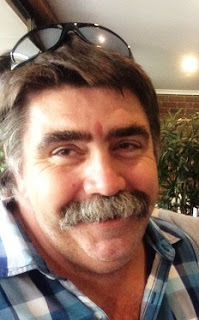 Many traditional western fans may be unaware Australia has deep roots in the genre. Australian writers such as Leonard Meares (alias Marshall Grover, Marshall McCoy, Johnny Nelson, Ward Brennan, Glenn Murrell, Shad Denver), Keith Hetherington (alias Jake Douglas, Hank J Kirby, Clayton Nash, Tyler Hatch, Kirk Hamilton, Brett Waring), and Paul Wheelahan (alias Emerson Dodge, Brett McKinley, E. Jefferson Clay) have literally produced thousands of western tales between them for the likes of Cleveland Publishing and the Horowitz Group—The Kangaroo Cowboys itching for a showdown at high noon calling out The Piccadilly Cowboys.
Many traditional western fans may be unaware Australia has deep roots in the genre. Australian writers such as Leonard Meares (alias Marshall Grover, Marshall McCoy, Johnny Nelson, Ward Brennan, Glenn Murrell, Shad Denver), Keith Hetherington (alias Jake Douglas, Hank J Kirby, Clayton Nash, Tyler Hatch, Kirk Hamilton, Brett Waring), and Paul Wheelahan (alias Emerson Dodge, Brett McKinley, E. Jefferson Clay) have literally produced thousands of western tales between them for the likes of Cleveland Publishing and the Horowitz Group—The Kangaroo Cowboys itching for a showdown at high noon calling out The Piccadilly Cowboys.Brent has already earned his writing spurs finding an eager audience for his western actioneers with a number of new titles heading for publication. Taking a short break to reload his word bullets, Brent has hitched his horse to the rail and joined us in the saloon to share his personal tale...******** Thank you, Paul, for the great introduction, kind words, and the chance to tell readers a little about myself and my works and inspirations.
What biographic details would be on the wanted poster for Brent Towns?
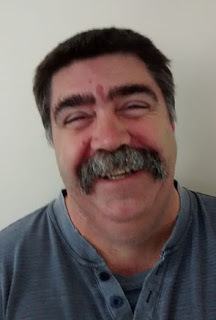 Let’s say I’m a middle-aged western fanatic with a very supportive wife and a young son. We live in Queensland, Australia, in a town on the sunshine coast. In a previous life I worked in a meatworks, a seaweed factory, in the hire industry and in a few caravan parks doing different jobs. I also mowed lawns and did gardening for a living too. Now, I’m a caregiver for my wife and son. For the first part of my life I lived on an island in the middle of Bass Strait between Tasmania and Victoria. A place renowned for Its cheese, beef and shipwrecks. After leaving there I’ve lived in Queensland, Western Australia, and Victoria.
Let’s say I’m a middle-aged western fanatic with a very supportive wife and a young son. We live in Queensland, Australia, in a town on the sunshine coast. In a previous life I worked in a meatworks, a seaweed factory, in the hire industry and in a few caravan parks doing different jobs. I also mowed lawns and did gardening for a living too. Now, I’m a caregiver for my wife and son. For the first part of my life I lived on an island in the middle of Bass Strait between Tasmania and Victoria. A place renowned for Its cheese, beef and shipwrecks. After leaving there I’ve lived in Queensland, Western Australia, and Victoria. When did you start writing?
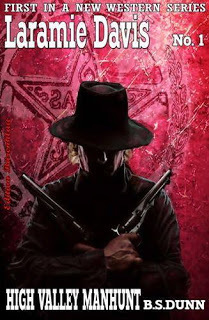 When I was young, I loved free writing at primary school and had a great imagination, even then. I was even lucky enough to have a poem published in a local paper. Later on, in high school, I had to write an essay for English class. After I handed it in, my teacher accused me of getting it from a book. I didn’t take too kindly to the accusation and eventually failed English that year. As a result, I moved away from writing to play golf and football instead.
When I was young, I loved free writing at primary school and had a great imagination, even then. I was even lucky enough to have a poem published in a local paper. Later on, in high school, I had to write an essay for English class. After I handed it in, my teacher accused me of getting it from a book. I didn’t take too kindly to the accusation and eventually failed English that year. As a result, I moved away from writing to play golf and football instead.What drew you to the western genre?
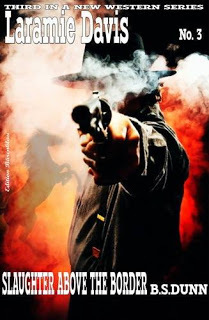 My love of all things western. I used to watch The Lone Ranger as a boy in the school holidays. I can also remember watching Night Of The Grizzly starring Clint Walker when I was about eight. Scared the crap out of me and I had nightmares for weeks after, but it was a great western. Later on, when I was eleven or twelve, a close friend of the family gave me a paper bag filled with Cleveland westerns. They’re quick, action-packed reads you can knock over in a couple of hours. I was hooked from then on.
My love of all things western. I used to watch The Lone Ranger as a boy in the school holidays. I can also remember watching Night Of The Grizzly starring Clint Walker when I was about eight. Scared the crap out of me and I had nightmares for weeks after, but it was a great western. Later on, when I was eleven or twelve, a close friend of the family gave me a paper bag filled with Cleveland westerns. They’re quick, action-packed reads you can knock over in a couple of hours. I was hooked from then on.*Since the early 1950s, Cleveland has published as many as eighteen stapled together, digest-sized, pulp westerns a month—continuing to this day.
Were you aware of Australia’s history in the western genre?
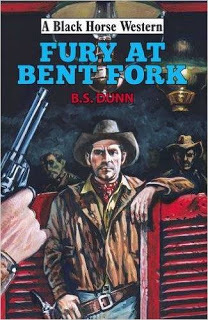 I wasn’t aware until I started reading Cleveland westerns along with the Marshall Grover penned Larry and Stretch books. I didn’t find out for a long time that many, if not most, of the books were written by a handful of Australian authors who used to write like machines.
I wasn’t aware until I started reading Cleveland westerns along with the Marshall Grover penned Larry and Stretch books. I didn’t find out for a long time that many, if not most, of the books were written by a handful of Australian authors who used to write like machines.*Marshall Grover was a pseudonym for prolific Australian writer Leonard F Meares, who wrote hundreds of Larry and Stretch books and others for Cleveland. He later took his characters another publisher, Horowitz, writing them under the pseudonym Marshall McCoy.
Did you start out self-publishing or did you sell your first books to a traditional publisher?
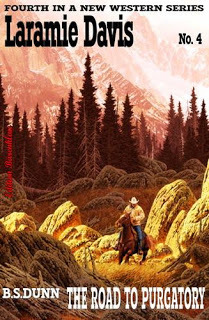 I started with the self-publishing route in 2015. It was easier, plus I had the self-doubt fears of rejection, which kept me from sending it off only to have it dismissed. My first self-published book was Last Stand in Sanctuary. In its first month, it sold a grand total of three copies. I didn’t care. I’d written a book and someone had bought it.
I started with the self-publishing route in 2015. It was easier, plus I had the self-doubt fears of rejection, which kept me from sending it off only to have it dismissed. My first self-published book was Last Stand in Sanctuary. In its first month, it sold a grand total of three copies. I didn’t care. I’d written a book and someone had bought it. 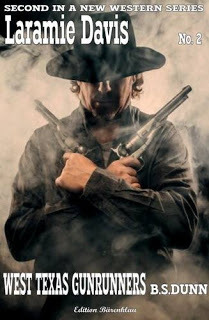 Next, I wrote and self-published High Valley Manhunt. It did a little better, but not much—enter the little doubting voice inside my head once more. I sent the manuscript to Ben Bridges, who I was friends with on Facebook, and asked him if he could please read it and tell me what he thought. He had it for a couple of weeks before I heard back. He told me there was nothing wrong with the story, which gave me the boost required to continue with my third book, which I sent to Robert Hale publishing in the UK.
Next, I wrote and self-published High Valley Manhunt. It did a little better, but not much—enter the little doubting voice inside my head once more. I sent the manuscript to Ben Bridges, who I was friends with on Facebook, and asked him if he could please read it and tell me what he thought. He had it for a couple of weeks before I heard back. He told me there was nothing wrong with the story, which gave me the boost required to continue with my third book, which I sent to Robert Hale publishing in the UK.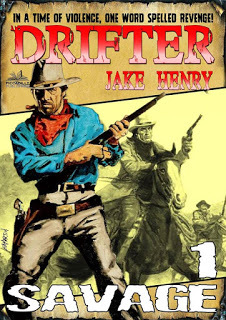 After a month, I heard back from Robert Hale stating they were happy to take the manuscript off my hands. Once accepted there, I never looked back. All I wanted to do was keep writing. No sooner would I finish one, before I would start on the next. Later the same year, I was also lucky enough to have Edition Barenklau in Germany pick up my self-published Laramie Davis series.
After a month, I heard back from Robert Hale stating they were happy to take the manuscript off my hands. Once accepted there, I never looked back. All I wanted to do was keep writing. No sooner would I finish one, before I would start on the next. Later the same year, I was also lucky enough to have Edition Barenklau in Germany pick up my self-published Laramie Davis series. Then, in 2016, I wrote my first book in The Drifter series for Piccadilly Publishing.
*Bestselling western author Ben Bridges (pseudonym for David Whitehead) is also the head honcho at Piccadilly Publishing
How did you come to use pseudonyms and how do you decided which one to use?
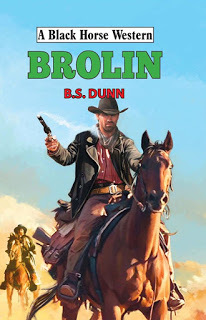 B.S. Dunn was the original name I used when I started this journey. It is a mix of my wife’s and my initials and the name of a street where we once lived. Black Horse Westerns in the UK only take four westerns per year per author. After I gave them two books in two months under the name B.S. Dunn, they said I needed to change my name for the third. I had an idea the third book would have a recurring character (Josh Ford), so I came up with the handle, Sam Clancy.
B.S. Dunn was the original name I used when I started this journey. It is a mix of my wife’s and my initials and the name of a street where we once lived. Black Horse Westerns in the UK only take four westerns per year per author. After I gave them two books in two months under the name B.S. Dunn, they said I needed to change my name for the third. I had an idea the third book would have a recurring character (Josh Ford), so I came up with the handle, Sam Clancy.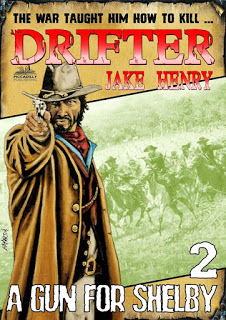 The Josh Ford book was originally to go to Piccadilly Publishing, but things changed and, after a brief discussion, The Drifter and the Jake Henry pseudonym were born. The Jake Henry pseudonym is to be exclusive to The Drifter series. Lastly, I have two books, possibly three, set to be published under my own name this year. One is a Black Horse western and the other two are stories in the Company ‘C’series started by Ben Bridges. This new series is something about which I’m extremely excited. I’ve been reading Ben’s books since the mid-eighties, so to be able to work with him on this project has been fantastic.
The Josh Ford book was originally to go to Piccadilly Publishing, but things changed and, after a brief discussion, The Drifter and the Jake Henry pseudonym were born. The Jake Henry pseudonym is to be exclusive to The Drifter series. Lastly, I have two books, possibly three, set to be published under my own name this year. One is a Black Horse western and the other two are stories in the Company ‘C’series started by Ben Bridges. This new series is something about which I’m extremely excited. I’ve been reading Ben’s books since the mid-eighties, so to be able to work with him on this project has been fantastic. Have you traveled the American west or do you work from research?
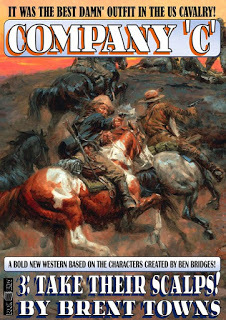 I’ve never been to America before and considering it’s a twenty-something hour flight, and the personal understanding I have with the big silver beast (hate flying), I probably never will step foot on those distant shores. All my work comes from research. I figure out where I want to set my story, then I look at pictures, research history, flora and fauna, clothing, etc., and make the rest up. I’ll glean a few facts to add to the story for authenticity (hopefully) and go from there. I currently have a book in the planning stages based around Crook’s 1883 campaign against the Apache, which is requiring a lot more research than usual.
I’ve never been to America before and considering it’s a twenty-something hour flight, and the personal understanding I have with the big silver beast (hate flying), I probably never will step foot on those distant shores. All my work comes from research. I figure out where I want to set my story, then I look at pictures, research history, flora and fauna, clothing, etc., and make the rest up. I’ll glean a few facts to add to the story for authenticity (hopefully) and go from there. I currently have a book in the planning stages based around Crook’s 1883 campaign against the Apache, which is requiring a lot more research than usual. Do you think you bring an Australian perspective to your westerns and if so how would you describe it?
I think the only Australian perspective I bring is my spelling. Once, I sent an electronic manuscript to a publisher in the US and he had to turn his spellcheck off because it went crazy.
What do you look for when you read a western?
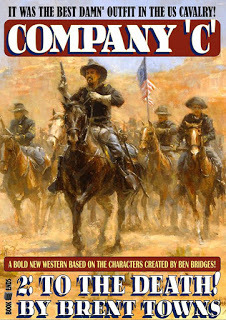 It all comes down to the story grabbing my attention within the first few pages. If it doesn’t, I won’t get past page 20. Because of this, I tend to pack (or try to have) so much action into my stories. I always have something happen within the first page or two for the reader to latch onto. I try not to read westerns over 200 pages as I feel there is too much fill, which outweighs the action. However, I sometimes I have to buy a longer book because of its cover. I like reading about range wars or gunfighters, so they get first preference when I’m looking for something to read.
It all comes down to the story grabbing my attention within the first few pages. If it doesn’t, I won’t get past page 20. Because of this, I tend to pack (or try to have) so much action into my stories. I always have something happen within the first page or two for the reader to latch onto. I try not to read westerns over 200 pages as I feel there is too much fill, which outweighs the action. However, I sometimes I have to buy a longer book because of its cover. I like reading about range wars or gunfighters, so they get first preference when I’m looking for something to read.What western novels and writers influenced you?
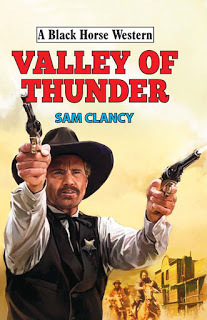 There wasn’t any one novel, but there were a number of writers—starting with the master (in my opinion), Louis L’Amour. I still remember the first book I read by L’Amour. It was called Kid Rodelo. There were many other L’Amour books I enjoyed—Kilkenny, The Key-Lock Man, The Sackett books—the list goes on and on. From Australia, I was always reading Paul Wheelahan, Keith Hetherington, and Len Meares. Of the British writers, Terry Harknett tops the list long with the Neil Hunter and the Ben Bridges westerns. The US writers are too many to name.
There wasn’t any one novel, but there were a number of writers—starting with the master (in my opinion), Louis L’Amour. I still remember the first book I read by L’Amour. It was called Kid Rodelo. There were many other L’Amour books I enjoyed—Kilkenny, The Key-Lock Man, The Sackett books—the list goes on and on. From Australia, I was always reading Paul Wheelahan, Keith Hetherington, and Len Meares. Of the British writers, Terry Harknett tops the list long with the Neil Hunter and the Ben Bridges westerns. The US writers are too many to name.What book you would read to your kids?
Thomas the Tank Engineand Mr. Men books. My son loves them.
What is your favorite classic?
Hahaha. I have to laugh, sorry. As far as the classics are concerned, I guess you could call me a literary heathen. I’ve never read one.
What book would you like to see as a movie?
When I’m not reading westerns, I’m quite partial to a good Swords-and-Sandals story, so it would be great to see some big budget movies surrounding the Simon Scarrow tales about Macro and Cato.
What imaginary place from a book would you want to live?
Nothing so imaginary about this answer. I’ve always liked the look of the English countryside. If I had to choose, it would be there.
What genre would you read if you were limited to one?
Easy—westerns.
Is there a book you’ve returned to again and again?
I used to read my Cleveland westerns over and over. Now, however, there are too many books going forward to go back.
What fictional character would you like to have a beer with?
Dutchy Holland. He was a fictional character created by J.E. MacDonnell in a naval series set in World War Two. One which, I have over 50 copies of sitting on my bookshelf. Holland was a destroyer commander with a gung ho, damn the torpedoes type of attitude and a small soft center somewhere deep down. Early in the series, he skippered a destroyer in the middle-east with virtually no air-defense capability. His solution—arm his crew with machine guns and rifles and have them shoot at the Stukas as they came down.
What was the last novel to make you cry?
It wasn’t a novel, it was a non-fiction book called Dead Men Risen. It was about the Welsh Guards in Afghanistan. It gave me at least one I’ve-got-something-in-my-eye moment.
What are you reading now?
It might be easier to ask me what I’m not reading. Currently, I’m into Red Rock Rampage by Ben Boulden, Black, Red, and Deadly by Art Burton, SOG by John L Plaster, and The Apache Wars by Paul Andrew Hutton.
What is coming up for you in the realm of the wild west?
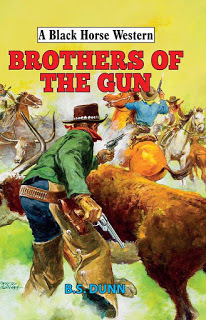 Currently, I’m writing the latest Josh Ford book for Black Horse. Next on the list is a new entry in The Drifter series, followed by a new Company ‘C’ book. This month an e-book edition of Brolin will be published by Piccadilly Publishing and Company ‘C’—To the Death! should be available soon from Bookends Publishing. July sees the release of the second Josh Ford book, Even Marshals Hang, from Black Horse. And there should be at least three more books in The Drifter series later this year.********Thx to Brent Towns for chatting while reloading his keyboard with word bullets. Be sure to check out all his westerns, which are available via Amazon and other book outlets…
Currently, I’m writing the latest Josh Ford book for Black Horse. Next on the list is a new entry in The Drifter series, followed by a new Company ‘C’ book. This month an e-book edition of Brolin will be published by Piccadilly Publishing and Company ‘C’—To the Death! should be available soon from Bookends Publishing. July sees the release of the second Josh Ford book, Even Marshals Hang, from Black Horse. And there should be at least three more books in The Drifter series later this year.********Thx to Brent Towns for chatting while reloading his keyboard with word bullets. Be sure to check out all his westerns, which are available via Amazon and other book outlets…
Published on November 23, 2017 21:06
SIX-GUNS DOWN UNDER ~ BRENT TOWNS

 SIX-GUNS DOWN UNDERBRENT TOWNSThere’s a new wordslinger in town...or in this case, Towns. Much as the mean and dangerous British writers known as the Piccadilly Cowboys did in the ’70, writing uber-action filled westerns from the wilds of London (and surrounding environs), Brent Towns has recently exploded onto the stage of the western genre from a far distant land—Australia. With six-guns blazing from his key board, Brent has trigger fanned over a dozen top-notch westerns under his own name and a trio of wanted alias: B. S. Dunn, Jake Henry, and Sam Clancy.
SIX-GUNS DOWN UNDERBRENT TOWNSThere’s a new wordslinger in town...or in this case, Towns. Much as the mean and dangerous British writers known as the Piccadilly Cowboys did in the ’70, writing uber-action filled westerns from the wilds of London (and surrounding environs), Brent Towns has recently exploded onto the stage of the western genre from a far distant land—Australia. With six-guns blazing from his key board, Brent has trigger fanned over a dozen top-notch westerns under his own name and a trio of wanted alias: B. S. Dunn, Jake Henry, and Sam Clancy. Many traditional western fans may be unaware Australia has deep roots in the genre. Australian writers such as Leonard Meares (alias Marshall Grover, Marshall McCoy, Johnny Nelson, Ward Brennan, Glenn Murrell, Shad Denver), Keith Hetherington (alias Jake Douglas, Hank J Kirby, Clayton Nash, Tyler Hatch, Kirk Hamilton, Brett Waring), and Paul Wheelahan (alias Emerson Dodge, Brett McKinley, E. Jefferson Clay) have literally produced thousands of western tales between them for the likes of Cleveland Publishing and the Horowitz Group—The Kangaroo Cowboys itching for a showdown at high noon calling out The Piccadilly Cowboys.
Many traditional western fans may be unaware Australia has deep roots in the genre. Australian writers such as Leonard Meares (alias Marshall Grover, Marshall McCoy, Johnny Nelson, Ward Brennan, Glenn Murrell, Shad Denver), Keith Hetherington (alias Jake Douglas, Hank J Kirby, Clayton Nash, Tyler Hatch, Kirk Hamilton, Brett Waring), and Paul Wheelahan (alias Emerson Dodge, Brett McKinley, E. Jefferson Clay) have literally produced thousands of western tales between them for the likes of Cleveland Publishing and the Horowitz Group—The Kangaroo Cowboys itching for a showdown at high noon calling out The Piccadilly Cowboys.Brent has already earned his writing spurs finding an eager audience for his western actioneers with a number of new titles heading for publication. Taking a short break to reload his word bullets, Brent has hitched his horse to the rail and joined us in the saloon to share his personal tale...******** Thank you, Paul, for the great introduction, kind words, and the chance to tell readers a little about myself and my works and inspirations.
What biographic details would be on the wanted poster for Brent Towns?
 Let’s say I’m a middle-aged western fanatic with a very supportive wife and a young son. We live in Queensland, Australia, in a town on the sunshine coast. In a previous life I worked in a meatworks, a seaweed factory, in the hire industry and in a few caravan parks doing different jobs. I also mowed lawns and did gardening for a living too. Now, I’m a caregiver for my wife and son. For the first part of my life I lived on an island in the middle of Bass Strait between Tasmania and Victoria. A place renowned for Its cheese, beef and shipwrecks. After leaving there I’ve lived in Queensland, Western Australia, and Victoria.
Let’s say I’m a middle-aged western fanatic with a very supportive wife and a young son. We live in Queensland, Australia, in a town on the sunshine coast. In a previous life I worked in a meatworks, a seaweed factory, in the hire industry and in a few caravan parks doing different jobs. I also mowed lawns and did gardening for a living too. Now, I’m a caregiver for my wife and son. For the first part of my life I lived on an island in the middle of Bass Strait between Tasmania and Victoria. A place renowned for Its cheese, beef and shipwrecks. After leaving there I’ve lived in Queensland, Western Australia, and Victoria. When did you start writing?
 When I was young, I loved free writing at primary school and had a great imagination, even then. I was even lucky enough to have a poem published in a local paper. Later on, in high school, I had to write an essay for English class. After I handed it in, my teacher accused me of getting it from a book. I didn’t take too kindly to the accusation and eventually failed English that year. As a result, I moved away from writing to play golf and football instead.
When I was young, I loved free writing at primary school and had a great imagination, even then. I was even lucky enough to have a poem published in a local paper. Later on, in high school, I had to write an essay for English class. After I handed it in, my teacher accused me of getting it from a book. I didn’t take too kindly to the accusation and eventually failed English that year. As a result, I moved away from writing to play golf and football instead.What drew you to the western genre?
 My love of all things western. I used to watch The Lone Ranger as a boy in the school holidays. I can also remember watching Night Of The Grizzly starring Clint Walker when I was about eight. Scared the crap out of me and I had nightmares for weeks after, but it was a great western. Later on, when I was eleven or twelve, a close friend of the family gave me a paper bag filled with Cleveland westerns. They’re quick, action-packed reads you can knock over in a couple of hours. I was hooked from then on.
My love of all things western. I used to watch The Lone Ranger as a boy in the school holidays. I can also remember watching Night Of The Grizzly starring Clint Walker when I was about eight. Scared the crap out of me and I had nightmares for weeks after, but it was a great western. Later on, when I was eleven or twelve, a close friend of the family gave me a paper bag filled with Cleveland westerns. They’re quick, action-packed reads you can knock over in a couple of hours. I was hooked from then on.*Since the early 1950s, Cleveland has published as many as eighteen stapled together, digest-sized, pulp westerns a month—continuing to this day.
Were you aware of Australia’s history in the western genre?
 I wasn’t aware until I started reading Cleveland westerns along with the Marshall Grover penned Larry and Stretch books. I didn’t find out for a long time that many, if not most, of the books were written by a handful of Australian authors who used to write like machines.
I wasn’t aware until I started reading Cleveland westerns along with the Marshall Grover penned Larry and Stretch books. I didn’t find out for a long time that many, if not most, of the books were written by a handful of Australian authors who used to write like machines.*Marshall Grover was a pseudonym for prolific Australian writer Leonard F Meares, who wrote hundreds of Larry and Stretch books and others for Cleveland. He later took his characters another publisher, Horowitz, writing them under the pseudonym Marshall McCoy.
Did you start out self-publishing or did you sell your first books to a traditional publisher?
 I started with the self-publishing route in 2015. It was easier, plus I had the self-doubt fears of rejection, which kept me from sending it off only to have it dismissed. My first self-published book was Last Stand in Sanctuary. In its first month, it sold a grand total of three copies. I didn’t care. I’d written a book and someone had bought it.
I started with the self-publishing route in 2015. It was easier, plus I had the self-doubt fears of rejection, which kept me from sending it off only to have it dismissed. My first self-published book was Last Stand in Sanctuary. In its first month, it sold a grand total of three copies. I didn’t care. I’d written a book and someone had bought it.  Next, I wrote and self-published High Valley Manhunt. It did a little better, but not much—enter the little doubting voice inside my head once more. I sent the manuscript to Ben Bridges, who I was friends with on Facebook, and asked him if he could please read it and tell me what he thought. He had it for a couple of weeks before I heard back. He told me there was nothing wrong with the story, which gave me the boost required to continue with my third book, which I sent to Robert Hale publishing in the UK.
Next, I wrote and self-published High Valley Manhunt. It did a little better, but not much—enter the little doubting voice inside my head once more. I sent the manuscript to Ben Bridges, who I was friends with on Facebook, and asked him if he could please read it and tell me what he thought. He had it for a couple of weeks before I heard back. He told me there was nothing wrong with the story, which gave me the boost required to continue with my third book, which I sent to Robert Hale publishing in the UK. After a month, I heard back from Robert Hale stating they were happy to take the manuscript off my hands. Once accepted there, I never looked back. All I wanted to do was keep writing. No sooner would I finish one, before I would start on the next. Later the same year, I was also lucky enough to have Edition Barenklau in Germany pick up my self-published Laramie Davis series.
After a month, I heard back from Robert Hale stating they were happy to take the manuscript off my hands. Once accepted there, I never looked back. All I wanted to do was keep writing. No sooner would I finish one, before I would start on the next. Later the same year, I was also lucky enough to have Edition Barenklau in Germany pick up my self-published Laramie Davis series. Then, in 2016, I wrote my first book in The Drifter series for Piccadilly Publishing.
*Bestselling western author Ben Bridges (pseudonym for David Whitehead) is also the head honcho at Piccadilly Publishing
How did you come to use pseudonyms and how do you decided which one to use?
 B.S. Dunn was the original name I used when I started this journey. It is a mix of my wife’s and my initials and the name of a street where we once lived. Black Horse Westerns in the UK only take four westerns per year per author. After I gave them two books in two months under the name B.S. Dunn, they said I needed to change my name for the third. I had an idea the third book would have a recurring character (Josh Ford), so I came up with the handle, Sam Clancy.
B.S. Dunn was the original name I used when I started this journey. It is a mix of my wife’s and my initials and the name of a street where we once lived. Black Horse Westerns in the UK only take four westerns per year per author. After I gave them two books in two months under the name B.S. Dunn, they said I needed to change my name for the third. I had an idea the third book would have a recurring character (Josh Ford), so I came up with the handle, Sam Clancy. The Josh Ford book was originally to go to Piccadilly Publishing, but things changed and, after a brief discussion, The Drifter and the Jake Henry pseudonym were born. The Jake Henry pseudonym is to be exclusive to The Drifter series. Lastly, I have two books, possibly three, set to be published under my own name this year. One is a Black Horse western and the other two are stories in the Company ‘C’series started by Ben Bridges. This new series is something about which I’m extremely excited. I’ve been reading Ben’s books since the mid-eighties, so to be able to work with him on this project has been fantastic.
The Josh Ford book was originally to go to Piccadilly Publishing, but things changed and, after a brief discussion, The Drifter and the Jake Henry pseudonym were born. The Jake Henry pseudonym is to be exclusive to The Drifter series. Lastly, I have two books, possibly three, set to be published under my own name this year. One is a Black Horse western and the other two are stories in the Company ‘C’series started by Ben Bridges. This new series is something about which I’m extremely excited. I’ve been reading Ben’s books since the mid-eighties, so to be able to work with him on this project has been fantastic. Have you traveled the American west or do you work from research?
 I’ve never been to America before and considering it’s a twenty-something hour flight, and the personal understanding I have with the big silver beast (hate flying), I probably never will step foot on those distant shores. All my work comes from research. I figure out where I want to set my story, then I look at pictures, research history, flora and fauna, clothing, etc., and make the rest up. I’ll glean a few facts to add to the story for authenticity (hopefully) and go from there. I currently have a book in the planning stages based around Crook’s 1883 campaign against the Apache, which is requiring a lot more research than usual.
I’ve never been to America before and considering it’s a twenty-something hour flight, and the personal understanding I have with the big silver beast (hate flying), I probably never will step foot on those distant shores. All my work comes from research. I figure out where I want to set my story, then I look at pictures, research history, flora and fauna, clothing, etc., and make the rest up. I’ll glean a few facts to add to the story for authenticity (hopefully) and go from there. I currently have a book in the planning stages based around Crook’s 1883 campaign against the Apache, which is requiring a lot more research than usual. Do you think you bring an Australian perspective to your westerns and if so how would you describe it?
I think the only Australian perspective I bring is my spelling. Once, I sent an electronic manuscript to a publisher in the US and he had to turn his spellcheck off because it went crazy.
What do you look for when you read a western?
 It all comes down to the story grabbing my attention within the first few pages. If it doesn’t, I won’t get past page 20. Because of this, I tend to pack (or try to have) so much action into my stories. I always have something happen within the first page or two for the reader to latch onto. I try not to read westerns over 200 pages as I feel there is too much fill, which outweighs the action. However, I sometimes I have to buy a longer book because of its cover. I like reading about range wars or gunfighters, so they get first preference when I’m looking for something to read.
It all comes down to the story grabbing my attention within the first few pages. If it doesn’t, I won’t get past page 20. Because of this, I tend to pack (or try to have) so much action into my stories. I always have something happen within the first page or two for the reader to latch onto. I try not to read westerns over 200 pages as I feel there is too much fill, which outweighs the action. However, I sometimes I have to buy a longer book because of its cover. I like reading about range wars or gunfighters, so they get first preference when I’m looking for something to read.What western novels and writers influenced you?
 There wasn’t any one novel, but there were a number of writers—starting with the master (in my opinion), Louis L’Amour. I still remember the first book I read by L’Amour. It was called Kid Rodelo. There were many other L’Amour books I enjoyed—Kilkenny, The Key-Lock Man, The Sackett books—the list goes on and on. From Australia, I was always reading Paul Wheelahan, Keith Hetherington, and Len Meares. Of the British writers, Terry Harknett tops the list long with the Neil Hunter and the Ben Bridges westerns. The US writers are too many to name.
There wasn’t any one novel, but there were a number of writers—starting with the master (in my opinion), Louis L’Amour. I still remember the first book I read by L’Amour. It was called Kid Rodelo. There were many other L’Amour books I enjoyed—Kilkenny, The Key-Lock Man, The Sackett books—the list goes on and on. From Australia, I was always reading Paul Wheelahan, Keith Hetherington, and Len Meares. Of the British writers, Terry Harknett tops the list long with the Neil Hunter and the Ben Bridges westerns. The US writers are too many to name.What book you would read to your kids?
Thomas the Tank Engineand Mr. Men books. My son loves them.
What is your favorite classic?
Hahaha. I have to laugh, sorry. As far as the classics are concerned, I guess you could call me a literary heathen. I’ve never read one.
What book would you like to see as a movie?
When I’m not reading westerns, I’m quite partial to a good Swords-and-Sandals story, so it would be great to see some big budget movies surrounding the Simon Scarrow tales about Macro and Cato.
What imaginary place from a book would you want to live?
Nothing so imaginary about this answer. I’ve always liked the look of the English countryside. If I had to choose, it would be there.
What genre would you read if you were limited to one?
Easy—westerns.
Is there a book you’ve returned to again and again?
I used to read my Cleveland westerns over and over. Now, however, there are too many books going forward to go back.
What fictional character would you like to have a beer with?
Dutchy Holland. He was a fictional character created by J.E. MacDonnell in a naval series set in World War Two. One which, I have over 50 copies of sitting on my bookshelf. Holland was a destroyer commander with a gung ho, damn the torpedoes type of attitude and a small soft center somewhere deep down. Early in the series, he skippered a destroyer in the middle-east with virtually no air-defense capability. His solution—arm his crew with machine guns and rifles and have them shoot at the Stukas as they came down.
What was the last novel to make you cry?
It wasn’t a novel, it was a non-fiction book called Dead Men Risen. It was about the Welsh Guards in Afghanistan. It gave me at least one I’ve-got-something-in-my-eye moment.
What are you reading now?
It might be easier to ask me what I’m not reading. Currently, I’m into Red Rock Rampage by Ben Boulden, Black, Red, and Deadly by Art Burton, SOG by John L Plaster, and The Apache Wars by Paul Andrew Hutton.
What is coming up for you in the realm of the wild west?
 Currently, I’m writing the latest Josh Ford book for Black Horse. Next on the list is a new entry in The Drifter series, followed by a new Company ‘C’ book. This month an e-book edition of Brolin will be published by Piccadilly Publishing and Company ‘C’—To the Death! should be available soon from Bookends Publishing. July sees the release of the second Josh Ford book, Even Marshals Hang, from Black Horse. And there should be at least three more books in The Drifter series later this year.********Thx to Brent Towns for chatting while reloading his keyboard with word bullets. Be sure to check out all his westerns, which are available via Amazon and other book outlets…
Currently, I’m writing the latest Josh Ford book for Black Horse. Next on the list is a new entry in The Drifter series, followed by a new Company ‘C’ book. This month an e-book edition of Brolin will be published by Piccadilly Publishing and Company ‘C’—To the Death! should be available soon from Bookends Publishing. July sees the release of the second Josh Ford book, Even Marshals Hang, from Black Horse. And there should be at least three more books in The Drifter series later this year.********Thx to Brent Towns for chatting while reloading his keyboard with word bullets. Be sure to check out all his westerns, which are available via Amazon and other book outlets…
Published on November 23, 2017 21:06
November 22, 2017
BRIT-WEST: ON THE PROD WITH RAY FOSTER
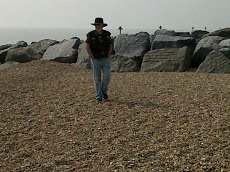 BRIT-WEST: ON THE PROD WITH RAY FOSTER
BRIT-WEST: ON THE PROD WITH RAY FOSTERFollowing in the footsteps of Brit-West writers such as J. T. Edson, Matt Chisholm (pseudonym for the prolific Peter Watts), and the Piccadilly Cowboys, Ray Foster—behind his Jack Giles pseudonym—is another fine example of English wordslingers taking on the Western genre.
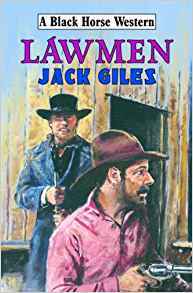 Ray’s story, however, is a bit different. In 1999, Ray suffered a stroke, which ended his career in the law. However, the stroke had even greater consequences: “This happened on the 9th August, 1999. When I woke up, I thought it was 1969. I had lost 30 years of memories. I didn’t know I had become a published writer. My wife told me while I was reading one of my own books. After reading a review of one of my books, I discovered the Black Horse Western site and linked up with many of the writers who encouraged me to write a short story for their first anthology. This was followed by a book Lawmen, which began with something I said to my wife while taking off a red plaid jacket.”
Ray’s story, however, is a bit different. In 1999, Ray suffered a stroke, which ended his career in the law. However, the stroke had even greater consequences: “This happened on the 9th August, 1999. When I woke up, I thought it was 1969. I had lost 30 years of memories. I didn’t know I had become a published writer. My wife told me while I was reading one of my own books. After reading a review of one of my books, I discovered the Black Horse Western site and linked up with many of the writers who encouraged me to write a short story for their first anthology. This was followed by a book Lawmen, which began with something I said to my wife while taking off a red plaid jacket.”Ray’s wife and son participated in the following interview to help Ray answer the questions...
********If it was tacked up in the Sheriff’s office, what information would be included on a Wild West wanted poster with your picture on it?
I was born in North London at the end of the Second World War. Ten years later, we moved to Orpington, Kent. Workwise, I was a residential conveyance [solicitor/lawyer] until a stroke ended that career.
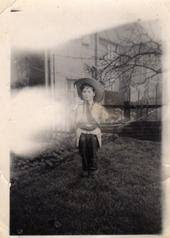 What was your introduction to Westerns—movies, TV, or books?
What was your introduction to Westerns—movies, TV, or books? None of those things—it was play. It was what we did as kids—pick up a stick and it became a pistol or a rifle. I didn’t see a cowboy film until I was about six years old and went to the Saturday morning pictures. Then Gene Autry and Tex Ritter came to the Haringey Arena—this was like the Wild West for real. The sight of a stagecoach chased by Indians for a kid like me was—wow! I got to meet Gene Autry. I was so gobsmacked I couldn’t say a thing.
What was the first Western you read?
Horn Silver by Frank C Robertson
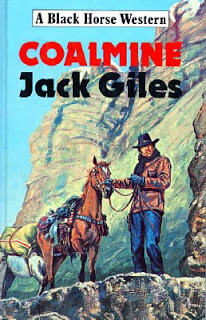 What was it about the genre you found compelling enough for you to want to write a Western?
What was it about the genre you found compelling enough for you to want to write a Western? Now here’s a thing—I always wanted to write a western or, at least try my hand at one, but westerns were written by Americans, so I thought I had no chance. The only British western writer I knew of was Oliver Strange (and I only knew that because my granddad was a typesetter for Geo. Newnes [publisher]). Still, I wrote a couple and shoved them in a drawer—until I discovered that George G. Gilman was British.
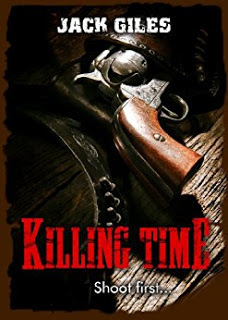 With that in mind, I sent one story off to various paperback publishers and I had some very encouraging rejections. Anyway, I wrote to George G. Gilman for advice. Simply, I had arrived at the end of the era—but he did suggest I send my books to Robert Hale, where both were accepted and published. But to answer the original question—ever since I was a kid I’ve grown up with the western in all forms, so it was just natural to want to write westerns.
With that in mind, I sent one story off to various paperback publishers and I had some very encouraging rejections. Anyway, I wrote to George G. Gilman for advice. Simply, I had arrived at the end of the era—but he did suggest I send my books to Robert Hale, where both were accepted and published. But to answer the original question—ever since I was a kid I’ve grown up with the western in all forms, so it was just natural to want to write westerns.Had you written books before, or was your first Western your literary debut?
Yes, I had started a novel, but life and bikes ended the process. Then I wrote another about 1964, set during the Battle Of Brighton and the aftermath from a Rockers point of view. However, I was told it was obvious I had not done my research—hadn’t I read the newspapers? In actuality, I had been there at the time. I still have the manuscript.
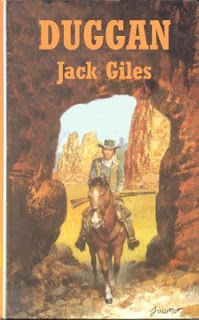 Were you aware of the legacy of the Piccadilly Cowboys and their impact on the genre before you started writing Westerns?
Were you aware of the legacy of the Piccadilly Cowboys and their impact on the genre before you started writing Westerns? No, they were all Americansas far as I knew—that was until I read an article in Wild West magazine on George G Gilman.
How do you see the current state of the Western genre?
Apart from Black Horse Westerns and Piccadilly Publishing there is not much going for the western in the UK. I once took Penguin to task over the lack of westerns from their U.S. market, but they were dismissive—claiming they had to look after their authors interests. Surely, it is in the US authors interests to get worldwide sales. British kids today do not grow up knowing the western as we kids did. There is an exception to every rule though when, a few years back, my sixteen year old (as she was then) had her first western short story published in an anthology.
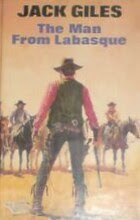 What was your journey to getting your first Western published?
What was your journey to getting your first Western published? Pretty smooth—only had to lose a fistful of words. My wife tells me, it was six months from beginning to end.
Have you been to the West, and if not, how do you do your research?
Sadly, I’ve never made it to the West. Therefore, it is imagination, looking at photos of landscape, reading reference books. As my wife says, if I couldn’t see it then it wouldn’t be written.
Is there any difference between Westerns written by British writer’s and Westerns written by homegrown American writers?
If there is then I can’t see the join.
Do you currently read Westerns, and if so, who are your favorite Western authors?
I rather like Brent Towns books, including all his other names; I always go back to L’Amour and Robertson; Jory Sherman (I miss him because we conversed over the net about one of my favourite non-western writers, Jack Kerouac); and also James Reasoner.
Do you have a writing mentor?
No—Writing is something I learned at school. It was just my imagination that got me into trouble.
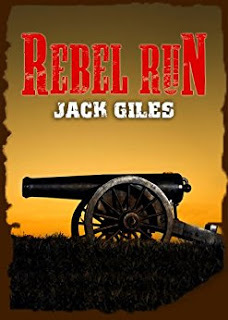 When you start writing a new Western, do you pick a standard Western plot (I think there are about six) and look for a way to turn it on its head, or do you look to history or some other source for inspiration?
When you start writing a new Western, do you pick a standard Western plot (I think there are about six) and look for a way to turn it on its head, or do you look to history or some other source for inspiration? Never planned a book—I start at page one and write like I was reading a book. My son tells me a story of how he challenged me to write a story where the bad guy turns out to be the hero and the other the antagonist. Got the job done.
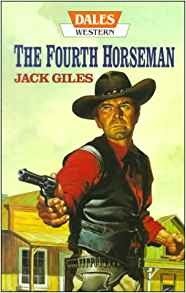 Where do you stand on indy versus small press versus traditional publishing?
Where do you stand on indy versus small press versus traditional publishing?I’ve read some good independently published books, but so many are badly written. I had a couple of old books picked up by a small publisher, but it wasn’t a great experience. Not enough to be dismissive though. So, I’m not so much sitting on the fence, but swinging on the gate with this one.
What is your latest Western and what are you currently writing?
Due to the stroke, writing is very hard. I hate not writing. I’ve done some short stories to help a friend and one to support the Felixstowe Scribblers. This is a marvelous group who encourage writers and writing, and certainly took me out of my comfort zone. I’m looking at some of my old stuff, and when I say old, I refer to something I wrote aged 17. If it was good back then, I kept and copied it onto old floppy discs. As for a western—I have no choice in the matter.
********I very much appreciated Ray taking the time to work through challenges to answer my questions, so I was delighted to receive the following note from Ray shortly after he sent me the answers to the interview question:
Quick update: Funny how things happen—like buses, you wait and wait for and then 3 come along at the same time. I’ve started 3 westerns—First, a sequel to my first published western, which is my morning job now. Afternoons, I am working on the first of two new westerns. First pages/chapters done.
This is terrific news and I can’t wait to read the finished stories...
TO VISIT RAY'S BLOG, BROKEN TRAILS, CLICK HERE
Published on November 22, 2017 09:53
November 21, 2017
BRIT—WEST: RIDING THE RANGE WITH JO WALPOLE
 BRIT—WEST: RIDING THE RANGE WITH JO WALPOLE During its long love affair with the Western, England has produced a long list of iconic genre writers, most of whom have never been West of the Mississippi. Bestselling Western authors such as J. T. Edson (English author of 137 Westerns, many of which are still in print), Matt Chisholm/Cy James/Luke Jones (all pseudonyms for Peter Watts), and the revered Piccadilly Cowboys (the subject of an upcoming blog post) have all made significant, enduring, and popular contributions to the Western genre. This Brit-West tradition continues today with a number of English authors gaining popular acclaim for their six-gun shoot-‘em-ups.
BRIT—WEST: RIDING THE RANGE WITH JO WALPOLE During its long love affair with the Western, England has produced a long list of iconic genre writers, most of whom have never been West of the Mississippi. Bestselling Western authors such as J. T. Edson (English author of 137 Westerns, many of which are still in print), Matt Chisholm/Cy James/Luke Jones (all pseudonyms for Peter Watts), and the revered Piccadilly Cowboys (the subject of an upcoming blog post) have all made significant, enduring, and popular contributions to the Western genre. This Brit-West tradition continues today with a number of English authors gaining popular acclaim for their six-gun shoot-‘em-ups.
 Over the next few blog posts, I’ll be sharing interviews with a few of England’s current Western genre practitioners. First to pull up a seat around the chuck wagon campfire is Joanne ‘Jo’ Walpole...Joanne’s first western was published in 2005. Since then she has written five more westerns, one civil war drama and a collection of contemporary shorts published under her own name and her better known pseudonym Terry James. She is currently writing a new series under the pseudonym, Joe Slade. She lives in central England with her husband Terry, where she reads, walks, follows current affairs, and continues writing westerns.********If it was tacked up in the Sheriff’s office, what information would be on a Wild West wanted poster with your picture on it? WANTEDALIVEJO WALPOLEaka Terry Jamesaka Joe SladeResponsible for writing Westerns since 2005Including, 5 Black Horse Westerns New series: Maggie O’BannenREWARDFree Cake And Sandwiches What was your introduction to Westerns—movies, TV, or books? Definitely TV. Definitely Alias Smith and Jones when I was a young child. I still watch the series from time to time. I love the dynamic between Heyes and Curry, their unbreakable friendship, and the humor. What was the first Western you read? I can’t remember, but I’d guess it was by Louis L’Amour, possibly Sackett. It’s definitely the first one that registers on my radar. Although I don’t read much L’Amour nowadays, he is one of my all time favorites and definitely an inspiration with his strong sense of justice and solid values.
Over the next few blog posts, I’ll be sharing interviews with a few of England’s current Western genre practitioners. First to pull up a seat around the chuck wagon campfire is Joanne ‘Jo’ Walpole...Joanne’s first western was published in 2005. Since then she has written five more westerns, one civil war drama and a collection of contemporary shorts published under her own name and her better known pseudonym Terry James. She is currently writing a new series under the pseudonym, Joe Slade. She lives in central England with her husband Terry, where she reads, walks, follows current affairs, and continues writing westerns.********If it was tacked up in the Sheriff’s office, what information would be on a Wild West wanted poster with your picture on it? WANTEDALIVEJO WALPOLEaka Terry Jamesaka Joe SladeResponsible for writing Westerns since 2005Including, 5 Black Horse Westerns New series: Maggie O’BannenREWARDFree Cake And Sandwiches What was your introduction to Westerns—movies, TV, or books? Definitely TV. Definitely Alias Smith and Jones when I was a young child. I still watch the series from time to time. I love the dynamic between Heyes and Curry, their unbreakable friendship, and the humor. What was the first Western you read? I can’t remember, but I’d guess it was by Louis L’Amour, possibly Sackett. It’s definitely the first one that registers on my radar. Although I don’t read much L’Amour nowadays, he is one of my all time favorites and definitely an inspiration with his strong sense of justice and solid values.
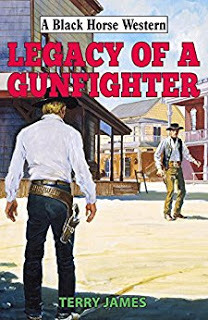 What was it about the genre you found compelling enough for you to want to write a Western?The good vs bad or white hat vs black hat element. It always seemed very clear-cut in the Saturday afternoon John Wayne, Glenn Ford type movies. I’m also a romantic at heart, so the guy getting the gal at the end was also a draw. Nowadays, I like it because it was a simpler time—no CCTV, no fast cars, no gadgets.
What was it about the genre you found compelling enough for you to want to write a Western?The good vs bad or white hat vs black hat element. It always seemed very clear-cut in the Saturday afternoon John Wayne, Glenn Ford type movies. I’m also a romantic at heart, so the guy getting the gal at the end was also a draw. Nowadays, I like it because it was a simpler time—no CCTV, no fast cars, no gadgets.Had you written books before, or was your first Western your literary debut?
My first Western—actually, a romance/western crossover—called Raven Dove was my first full book. Prior to that, I never seemed to get further than chapter three. However, I think the first full story I ever wrote would have been classed as a novella and revolved around footballers (soccer players) and their wives. I was about thirteen, so it wouldn’t have been very sophisticated. However, Westerns have always been the mainstay of my writing life, which was verified when a school friend who I hadn’t seen for 30 years contacted me on social media and asked, Do you still write Westerns? Do you still like Clint Eastwood?
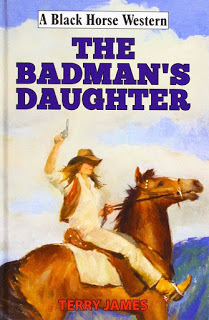 Were you aware of the legacy of the Piccadilly Cowboys and their impact on the genre before you started writing Westerns?
Were you aware of the legacy of the Piccadilly Cowboys and their impact on the genre before you started writing Westerns?No, I wasn’t. Until I joined the Black Horse Western stable of writers and started meeting my peers for the first time, Piccadilly Cowboys had never even blipped on my radar. Through discussions on forums and the like, I became more widely aware of the world of Western fiction—including the Piccadilly Cowboys and their contribution.
How do you see the current state of the Western genre?
It seems to be very buoyant, especially with e-books entering the mainstream. The variety of available stories is amazing. There is something for everyone from traditional to ultra violent with everything in between. The release of old classic series—like Edge and Crow—and authors like John Benteen and JT Edson in to digital format is great, especially now their paperbacks are getting harder to come by. However, I despair at the Westerns being made into movies, which seem to promote art over action. Give me a straight forward, standard John Wayne Western any day.
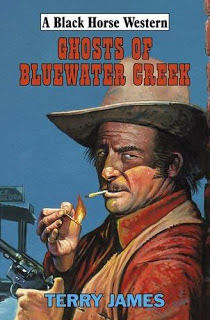 What was your journey to getting your first Western published?It wasn’t really a journey—more of a trip and fall. In 2003, I joined a romance forum on the Internet, and one of the sub-categories was work in progress. I started writing and posting a chapter at a time of an idea I’d always wanted to turn in to a novel. I received a lot of good feedback and advice. Before I knew it, I had a complete story. I thought I was done with it, but the people on the forum badgered me to submit it to a publisher, so I picked Whiskey Creek Press—because they were Internet based and it was an easy option. I sent it off just to stop people pestering me. I hadn’t thought about being published, didn’t consider myself good enough, and just wanted to get the refusal so I could wave it in their faces and say now leave me alone. As it turned out, I received a contract back by return e-mail.
What was your journey to getting your first Western published?It wasn’t really a journey—more of a trip and fall. In 2003, I joined a romance forum on the Internet, and one of the sub-categories was work in progress. I started writing and posting a chapter at a time of an idea I’d always wanted to turn in to a novel. I received a lot of good feedback and advice. Before I knew it, I had a complete story. I thought I was done with it, but the people on the forum badgered me to submit it to a publisher, so I picked Whiskey Creek Press—because they were Internet based and it was an easy option. I sent it off just to stop people pestering me. I hadn’t thought about being published, didn’t consider myself good enough, and just wanted to get the refusal so I could wave it in their faces and say now leave me alone. As it turned out, I received a contract back by return e-mail.Did you choose to use a gender ambiguous pseudonym for your first Westerns, or did Black Horse ask you to do it? What was your reasoning, or theirs?
I chose Terry James for two reasons. Firstly, I thought a man's name would be more acceptable on the cover of a genre read mostly by men. This quickly became irrelevant as I became known on forums, etc. Secondly, I picked Terry James as this is my husband's name, and I liked the idea.
With your Maggie O’Bannen series, you’ve again chosen to use a male pseudonym, but your real name and gender is acknowledged in the promotional author bio. Why choose Joe Slade this time and not go with Jo Walpole or Josephine Slade? When I first decided to write the Maggie O'Bannen series, I was in two minds whether to reveal it was by me. I had a vision of graphic sex and violence, and I wasn't sure I wanted to be personally associated with it. However, friends seemed to think I should, and no one except me seemed to bat an eyelid at the content, which I find a bit shocking in places to be honest. So, when Piccadilly asked me for a bio, I just went with it. Again, a male pseudonym seemed to be appropriate to the style of the writing.
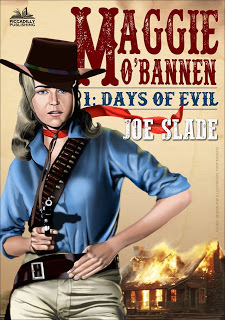 Acknowledging there are women who write action-centric Westerns (as opposed to cowboy romances), but comparatively, the genre is almost exclusively the domain of male authors. Has this been a challenge in any way, or have other Western authors and fans been accepting and supportive?
Acknowledging there are women who write action-centric Westerns (as opposed to cowboy romances), but comparatively, the genre is almost exclusively the domain of male authors. Has this been a challenge in any way, or have other Western authors and fans been accepting and supportive?I have been wholeheartedly supported by peers since deciding to write a violent action-centric Western series. The response to the first Maggie O'Bannen book has been very positive. To have the writer of a successful series suggest Maggie would give one if his hard-boiled characters a run for his money was mind-blowing praise. The reviews so far have been good. The fact I'm a woman doesn't seem to matter.
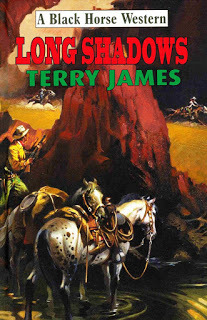 Have you been to the West, and if not, how do you do your research I’ve been to America a few times, but never to the West. Research has been a lifelong project and is ongoing. It started off with visits to the library and reference books before the Internet. Now my research is mostly done via the Internet, although, I do have a few reference books on my shelves at home I delve into when needed. These days, I also find fellow authors are a good source of information. Is there any difference between Westerns written by British writers and Westerns written by homegrown American writers? Not to me personally. I read Westerns written by British, Australian, and American authors and enjoy them equally. Do you currently read Westerns, and if so, who are your favorite Western authors? I pretty much only read Westerns. The ones cropping up week after week on my Kindle are John Benteen (Sundance, Fargo), Neil Hunter (Bodie), Ben Bridges (O’Brien) and relative newcomer—and friend—Brent Towns, who writes under the pseudonyms BS Dunn, Jake Henry and Sam Clancy. Do you have a writing mentor? I don’t think so, although, I do have good friends amongst my peers who allow me to pick their brains and blow off steam from time to time. They also keep me motivated because I’m a very lazy writer. When you start writing a new Western, do you pick a standard Western plot—I think there are about six—and look for a way to turn it on its head, or do you look to history or some other source for inspiration? Yes and no. Usually it’s something I’ve seen (TV, film) or read (news, fiction) that gives me a light bulb moment. Usually because it’s sent my mind off at a tangent wondering what if after the story ended, or just because it would be interesting or challenging to write it in a different way. For example Ghosts of Bluewater Creek is essentially a revenge Western, but I thought, what if the opening is the traditional gunfight ending and we see what happens from there. Other times, I can come up with a character I’d like to write and then decide what situations to throw them in to. Once or twice, I’ve had a scene in mind, maybe an ending, and written the story around it. I’m really quite random in my approach. Where do you stand on indy versus small press versus traditional publishing? Indy, as in self-publishing, I’m not keen on. My experience of reading it has been the editing is often poor, which for me as a reader is a deal breaker. Small press, like Hale/Crowood and Piccadilly, have been very easy to deal with and seem to get it right most of the time in terms of quality for the reader and lead times for the author. Traditional publishing is outside my experience, so I can’t comment. What is your latest Western and what are you currently writing? Maggie O’Bannen 1: Days of Evil, written under the pseudonym Joe Slade and published by Piccadilly Publishing, is my latest release. Essentially, Maggie is a victim who has the chance to take control of her life and grabs it with both hands. To survive, she has to dig deep and rely on new friends to help her survive and vice versa. As with all my stories, there is a strong sense of friendship and loyalty. However, in contrast to books I’ve written under the pseudonym Terry James, this series doesn’t pull any punches. Thanks to Piccadilly Publishing, I’ve been able to step well outside my comfort zone and unleash my inner maniac. The feedback I’ve received so far has been very positive and I’m currently writing the second book, tentatively titled Wanted: Dead.********Thanks to Jo for stopping by and sharing her experiences. TO FOLLOW JO ON THE WEB CLICK HERE
Have you been to the West, and if not, how do you do your research I’ve been to America a few times, but never to the West. Research has been a lifelong project and is ongoing. It started off with visits to the library and reference books before the Internet. Now my research is mostly done via the Internet, although, I do have a few reference books on my shelves at home I delve into when needed. These days, I also find fellow authors are a good source of information. Is there any difference between Westerns written by British writers and Westerns written by homegrown American writers? Not to me personally. I read Westerns written by British, Australian, and American authors and enjoy them equally. Do you currently read Westerns, and if so, who are your favorite Western authors? I pretty much only read Westerns. The ones cropping up week after week on my Kindle are John Benteen (Sundance, Fargo), Neil Hunter (Bodie), Ben Bridges (O’Brien) and relative newcomer—and friend—Brent Towns, who writes under the pseudonyms BS Dunn, Jake Henry and Sam Clancy. Do you have a writing mentor? I don’t think so, although, I do have good friends amongst my peers who allow me to pick their brains and blow off steam from time to time. They also keep me motivated because I’m a very lazy writer. When you start writing a new Western, do you pick a standard Western plot—I think there are about six—and look for a way to turn it on its head, or do you look to history or some other source for inspiration? Yes and no. Usually it’s something I’ve seen (TV, film) or read (news, fiction) that gives me a light bulb moment. Usually because it’s sent my mind off at a tangent wondering what if after the story ended, or just because it would be interesting or challenging to write it in a different way. For example Ghosts of Bluewater Creek is essentially a revenge Western, but I thought, what if the opening is the traditional gunfight ending and we see what happens from there. Other times, I can come up with a character I’d like to write and then decide what situations to throw them in to. Once or twice, I’ve had a scene in mind, maybe an ending, and written the story around it. I’m really quite random in my approach. Where do you stand on indy versus small press versus traditional publishing? Indy, as in self-publishing, I’m not keen on. My experience of reading it has been the editing is often poor, which for me as a reader is a deal breaker. Small press, like Hale/Crowood and Piccadilly, have been very easy to deal with and seem to get it right most of the time in terms of quality for the reader and lead times for the author. Traditional publishing is outside my experience, so I can’t comment. What is your latest Western and what are you currently writing? Maggie O’Bannen 1: Days of Evil, written under the pseudonym Joe Slade and published by Piccadilly Publishing, is my latest release. Essentially, Maggie is a victim who has the chance to take control of her life and grabs it with both hands. To survive, she has to dig deep and rely on new friends to help her survive and vice versa. As with all my stories, there is a strong sense of friendship and loyalty. However, in contrast to books I’ve written under the pseudonym Terry James, this series doesn’t pull any punches. Thanks to Piccadilly Publishing, I’ve been able to step well outside my comfort zone and unleash my inner maniac. The feedback I’ve received so far has been very positive and I’m currently writing the second book, tentatively titled Wanted: Dead.********Thanks to Jo for stopping by and sharing her experiences. TO FOLLOW JO ON THE WEB CLICK HERE
Published on November 21, 2017 07:59
November 14, 2017
STARK HOUSE DESPERADOS
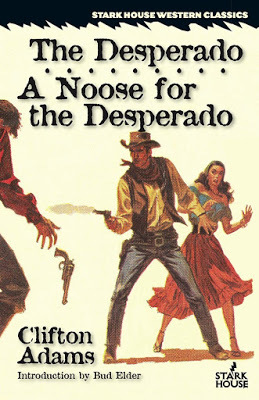
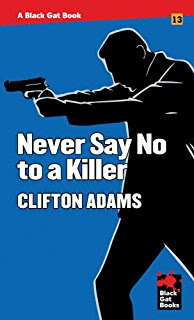 STARK HOUSE DESPERADOS
STARK HOUSE DESPERADOSNovember is Western Month over Stark House Press. Last year, Stark House offered a trio of tales in a collection of Harry Whittington’s distinctive shoot-‘em-ups. This year, it’s a duo of connected Western noirs from Clifton Adams—The Desperado and A Noose for the Desperado. These were the first two novels to be published by Adams, who would go on to write some chilling hardboiled novels published as Clifton Adams and using the pseudonym, Jonathan Gant—plus one oddball crime novel as Nick Hudson. Adams also wrote a many more Westerns, bylined by his own name, as well as the pseudonyms Clay Randall and Matt Kinkaid.
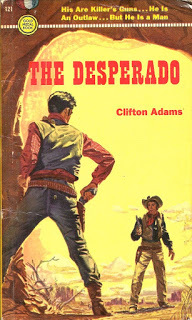 About half the books he wrote as Clay Randall feature a series character named Amos Flagg. Under his own name, Adams didn’t use repeating characters, with the exception of the two Desperado books. These follow Talbert Tall Cameron as an impulsive teenager who is quick to defend his honor. He gradually morphs into a hard-bitten gunslinger, ready to shoot first whenever the situation demands—which, as far as he is concerned, it frequently does.
About half the books he wrote as Clay Randall feature a series character named Amos Flagg. Under his own name, Adams didn’t use repeating characters, with the exception of the two Desperado books. These follow Talbert Tall Cameron as an impulsive teenager who is quick to defend his honor. He gradually morphs into a hard-bitten gunslinger, ready to shoot first whenever the situation demands—which, as far as he is concerned, it frequently does. 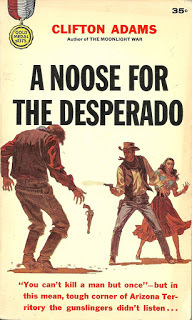 The Desperadobegins when blue-bellies kill Tall’s father. This sets off a series of self-justifications as Tall makes one bad choice after another on the way to becoming too quick on the trigger. He quickly alienates his friends and family, and finds himself a wanted outlaw with a bounty on his head. This is Western noir as dark, desolate, and deadly as any crime thriller. The sequel, A Noose for the Desperado, is just as harsh, bringing Tall’s story to its inevitable climax.
The Desperadobegins when blue-bellies kill Tall’s father. This sets off a series of self-justifications as Tall makes one bad choice after another on the way to becoming too quick on the trigger. He quickly alienates his friends and family, and finds himself a wanted outlaw with a bounty on his head. This is Western noir as dark, desolate, and deadly as any crime thriller. The sequel, A Noose for the Desperado, is just as harsh, bringing Tall’s story to its inevitable climax.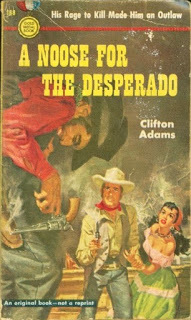 In this new Stark House collection of these two novels, Bud Elder, a fellow Oklahoma writer who knows the land and the people who inspired Clifton Adams, provides an informative new introduction. There is something timeless about a good western. Adams wrote these books 65+ years ago, but they are still as downbeat and gritty as they were when Gold Medal published them in the early 1950s.
In this new Stark House collection of these two novels, Bud Elder, a fellow Oklahoma writer who knows the land and the people who inspired Clifton Adams, provides an informative new introduction. There is something timeless about a good western. Adams wrote these books 65+ years ago, but they are still as downbeat and gritty as they were when Gold Medal published them in the early 1950s.Stark house is also featuring Clifton Adams’ blea
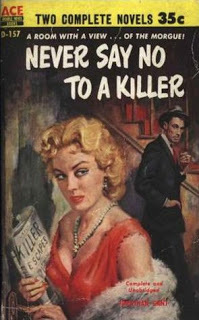 kest crime thriller, Never Say No to a Killer, under their Black Gat imprint. The first of two books written by Adams using his Jonathan Gant pseudonym, Never Say No to a Killer is finally published under the author’s real name. The main character, Roy Surratt, busts out of jail with the help of a mentor crook, and now has plans to run the city. All he has to do is stay clear of the cops. The problem is his ego. Whenever he wants something, he figures he can take it, including the beautiful secretary of his first victim. She outclasses him, but he figures he can charm her into submission. He proceeds to try to lie his way into her bed, and out of every tight situation he gets in. And when lying doesn’t work, there is always the gun…
kest crime thriller, Never Say No to a Killer, under their Black Gat imprint. The first of two books written by Adams using his Jonathan Gant pseudonym, Never Say No to a Killer is finally published under the author’s real name. The main character, Roy Surratt, busts out of jail with the help of a mentor crook, and now has plans to run the city. All he has to do is stay clear of the cops. The problem is his ego. Whenever he wants something, he figures he can take it, including the beautiful secretary of his first victim. She outclasses him, but he figures he can charm her into submission. He proceeds to try to lie his way into her bed, and out of every tight situation he gets in. And when lying doesn’t work, there is always the gun…As self-deluded and sociopathic as they come, Surratt is quite a character—and one of Adams’ finest creations. Author James Reasoner, in his Rough Edges blog, calls Never Say No to a Killer, “a skillfully written book with a very effective air of impending doom. The narrator may be fooling himself, but he’s not fooling us.”
MORE WESTERNS FROM CLIFTON ADAMS
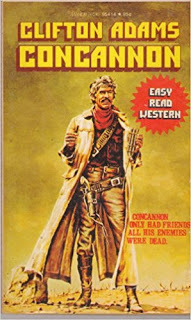
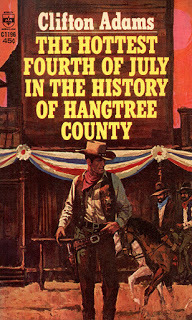
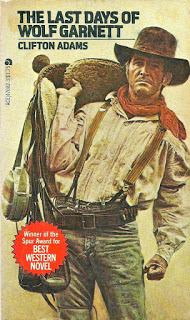
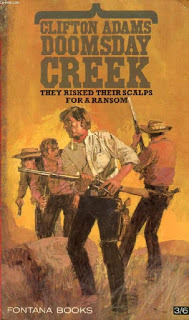
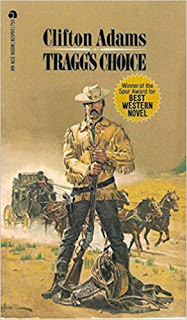
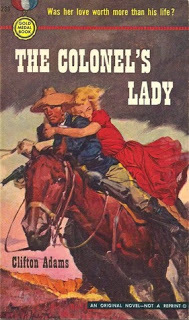
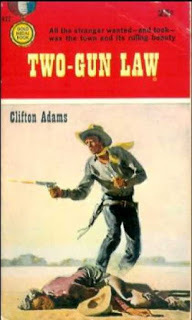
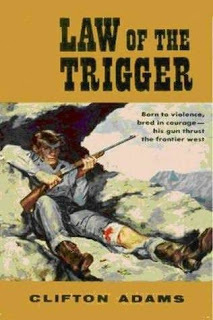 CLIFTON ADAMS WRITING AS CLAY RANDALL
CLIFTON ADAMS WRITING AS CLAY RANDALL
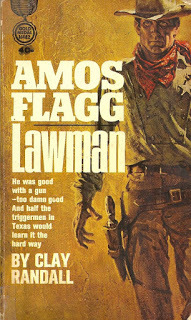
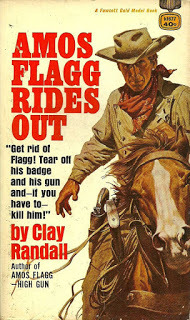
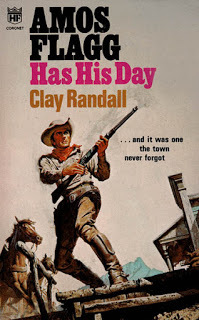
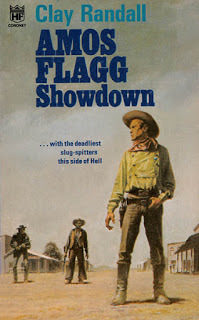
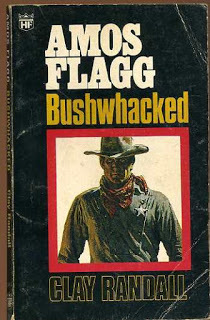
Published on November 14, 2017 22:39
November 11, 2017
SPALDING GETS HIS GROOVE ON
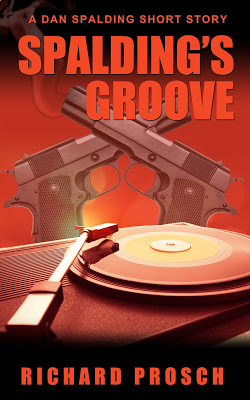
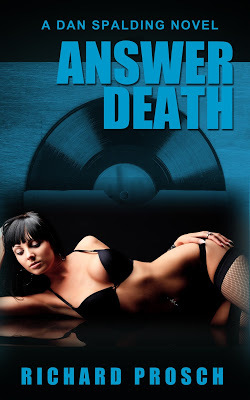 SPALDING GETS HIS GROOVE ON
SPALDING GETS HIS GROOVE ONSpur award-winning writer Richard Prosch is a master of short-story and novella length Westerns and crime stories with a vicious twist in the tail. He also writes the adventures of sassy twelve-year old Jo Harper set in 1910, Wyoming, which are a delight for all ages. Richard is currently debuting his new contemporary series character, Dan Spalding, in the short-story Spalding’s Groove and a new novel, Answer Death.
Having had the opportunity to preview Spalding’s brand of laidback, but tough enough style, I know Richard’s regular readers and new fans are going to get their thrills on in both tales. I was able to rope Richard into the interrogation corral for a few pointed questions...
******
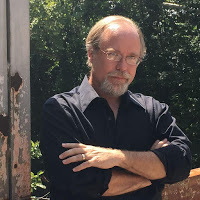 If the Texas Rangers nailed up a wanted poster for Richard Prosch, what information would it contain?
If the Texas Rangers nailed up a wanted poster for Richard Prosch, what information would it contain?Fierce advocate for the individual, for kids, and for an independent, western way of life increasingly on the wane. I grew up in Nebraska, lived in Wyoming and South Carolina, and was molded by all three—for the better. I’ve enjoyed a professional career in art and writing non-fiction and won some nice awards for my short stories, such as the WWA Spur Award.
What drove you to become a writer?
I’m an only child, and during my teens I had long uninterrupted periods of time working on the farm. I passed the time spent on mundane tasks by making up scenarios in my head. I dabbled with pen and paper. As a young adult, I typed out mountains of professional nonfiction, but to pull off good fiction takes a kind of maturity I didn’t believe I had. Finally in my mid-40s, my wife kicked me in the butt and made me realize I’m a better person—for myself and everybody else—when I’m regularly writing stories.
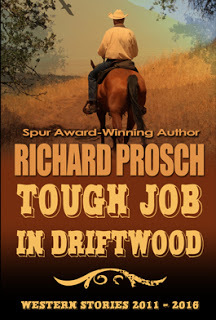 Did you choose to start your writing career with short stories and novellas or did those forms of storytelling choose you?
Did you choose to start your writing career with short stories and novellas or did those forms of storytelling choose you?They chose me. Fiction and nonfiction both, I’ve always loved the short form and those are the writers I read. Our grade-school library had those great Random House Alfred Hitchcock hardcover anthologies, and I practically owned them. I especially like Harlan Ellison because of the way he can move between short stories and personal essays. So those are the forms I started with.
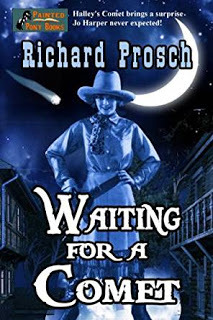 Your character of twelve year old Jo Harper is one of my favorites. Where did she come from and what was your goal in developing her stories?
Your character of twelve year old Jo Harper is one of my favorites. Where did she come from and what was your goal in developing her stories?Dean Wesley Smith says writing is perhaps the only art people—for some reason—don’t think you need to practice. He thinks you must practice writing, and I agree. The Jo Harper series developed when my son was nine or ten years old and I told him stories about old Nebraska my grandpa’s aunt told me when I was a kid. She was in her 80s and 90s at the time. So, Jo’s stories let me practice writing fiction—more or less under the radar—while also locking in some of those family yarns for my son.
You moved effortlessly between the Western and crime genres. Do you prefer one over the other or is your genre decision based on what fits a given story?
You phrased that well, Paul. It’s what fits a given story. All good fiction is driven by a good, often extreme, conflict. Crime, violence, the use of force, it’s all grist for the mill and most of the good westerns are good crime stories in their own right.
Who are the western and crime genre authors who have influenced you?
Tough one because I’m probably equally influenced by SF and nonfiction writers too. But in westerns, the top spots are—hands down—Ben Haas, Steve Frazee, and Elmore Leonard. In crime it’s Robert B. Parker, John D. MacDonald, and so many short story writers I can’t count them. David Edgerley Gates who does both genres so well is a favorite. Also Ed Hoch who wrote something like 900 short stories.
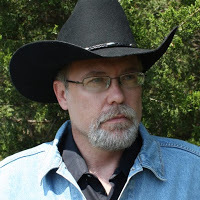 A cool highlight of your new Dan Spalding stories is Spalding’s Groove, the record store Dan inherited from his brother. Did you grab the idea from the muse of inspiration or do you have a history with record stores, their diversity of stock, and their edge of slightly seedy desperation?
A cool highlight of your new Dan Spalding stories is Spalding’s Groove, the record store Dan inherited from his brother. Did you grab the idea from the muse of inspiration or do you have a history with record stores, their diversity of stock, and their edge of slightly seedy desperation?That’s a perfectly apt description of my favorite place! I’ve always loved record stores—nearly as much as book stores. Any new town I come to, I look for a book store, a record store, or an antique shop that might have books and records both. I also grew up at a great time, with anything and everything on vinyl and a mom who enjoyed listening to records. It’s something I do know something about, and I want to explore that with the Spalding series.
Did the character of Dan Spalding come to you fully ready for action or did he develop on the page?
Pretty much ready for action. I have a variety of friends my age in law enforcement and we tend to talk a lot about the culture, which leads to music. Spalding isn’t based on any particular person in real life, but more of an amalgam of these guys. Spalding is eventually able to live his dream of being surrounded by music, but he’s still got that warrior Sheepdog ethos inside.
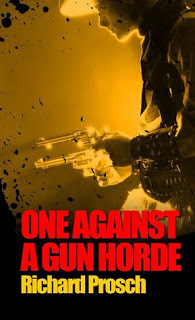 Do you read mostly fiction or nonfiction or an even mix?
Do you read mostly fiction or nonfiction or an even mix?An even mix, though more nonfiction lately. I train in Karate and with society being what it is lately, I’m interested in essays on conflict and defense by writers like Rory Miller and Marc MacYoung.
Who are your current favorite authors in the Western and Crime genres?
I try to read everything Paul Bishop puts out—grin. In truth, your Lie Catchers broke new ground for me. Good stuff! To the question, for westerns I go to Pete Brandvold and Wayne Dundee. For crime it’s Lee Goldberg, Brendan Dubois, a few others.
Where do you stand on indy vs. legacy/traditional publishing?
I’ve always thought of myself as a hybrid writer. I like the opportunities a good publisher can offer, but I value the control and experience of indy work. I think with the time frame inherent to traditional publishing, the only way to make a living as a writer is by going solo with part or most of your output.
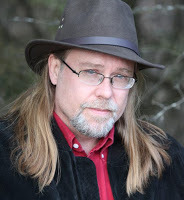 Is there a specific book or author you find yourself recommending over and over?
Is there a specific book or author you find yourself recommending over and over?John D. MacDonald. More than anybody else, he was able to combine personal observation with his characters so it didn’t feel forced or pedantic. He was a master at rich characterization and capturing the time and place of a scene. And what an output!
Is there a book you’ve returned to again and again?
Ray Bradbury’s Dandelion Wine, which I first read as a teenager. It’s brilliant! Simple and complex. Deliberately nostalgic, yet sneakily timeless. Depending on your mindset, you can read it as a series of short stories, or a novel. I try to touch base with it every year.
What is the last book you read?
My last book was a re-read of The Adventures of Tom Sawyer by Mark Twain, but the last new book I read was Double Wide by Leo W. Banks.
What is the last book you bought?
Beyond the Picket Fence by Mark MacYoung
What was the last novel to make you laugh?
Man, that’s hard because I don’t laugh easily. Probably Cat’s Cradle by Vonnegut.
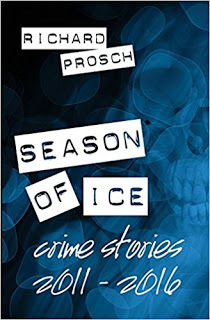 What was the last novel to make you cry?
What was the last novel to make you cry?Easy one. Dandelion Wine and the story of The Happiness Machine.
What’s next for Dan Spalding and Richard Prosch?
I’m working on the next Spalding novel, Flip Side, and a new western novel based on my short story in the new Best of the West anthology from Sundown Press. We’re also releasing my three John Coburn e-book novellas in a print collection next month, so that will be fun.
******Thx to Richard for his answers and for the many great stories in his short-story collections, novellas, and novels...And for all of his great stories yet to come...
Published on November 11, 2017 22:28
November 5, 2017
WESTERN MUSINGS
 WESTERN MUSINGS
WESTERN MUSINGSOn his Western Musings blog, Western fan and aficionado Mark Hatmaker posted the following praise for 52 Weeks • 52 Western Novels...Scott and I appreciate his comments...52 WEEKS• 52 WESTERN NOVELS
“There is a power and beauty to a good ol’ fashioned Western that is hard to find in any other genre.” ~ Scott Harris
“There is blazing six-gun action on every one of the following pages. Hopefully, you will be reminded of some old friends and intrigued and excited by some new discoveries.”~Paul Bishop
The quoted salvos from the co-authors’ introductions to this book sum up what you will find within. The full title of the book is 52 Weeks 52 Western Novels: six-Gun Favorites and New Discoveries and that about nails it.Hardcore Western fans, and I am wagering all genre fans in general, love a good recommendation, love a new list. We love the finger that points to a what is, hopefully, a brand-new piece of reading gold.
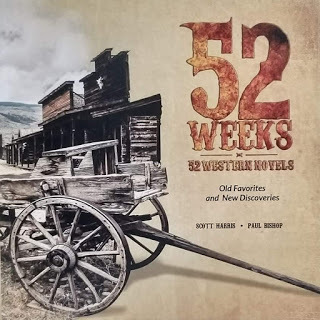 Often such “Best Of…” lists, no matter the genre, are mighty familiar. There are acknowledged classics to be touted and so often the heft of the list is taken up by works the devout reader has already consumed, and we are left with hopes of finding fresh titles lurking way down the list.
Often such “Best Of…” lists, no matter the genre, are mighty familiar. There are acknowledged classics to be touted and so often the heft of the list is taken up by works the devout reader has already consumed, and we are left with hopes of finding fresh titles lurking way down the list.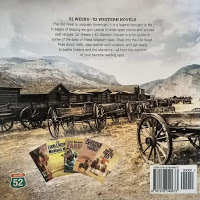 Here, there is a refreshingly different approach. Lonesome Dove is not listed. Not because of any perceived antipathy to Mr. McMurtry, but rather the authors seem to be saying, “We all know Lonesome Dove is brilliant, right? But how many times can we read it? What else is there?”
Here, there is a refreshingly different approach. Lonesome Dove is not listed. Not because of any perceived antipathy to Mr. McMurtry, but rather the authors seem to be saying, “We all know Lonesome Dove is brilliant, right? But how many times can we read it? What else is there?”
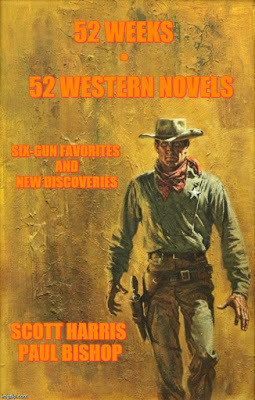 This approach allows the list and recommendations to breathe with fresh choices, with picks that often fall by the way side. Here, the hardcore Western fan will mostly be confronted with, “Hmm, I’d forgotten about that one” or, “Wait a minute, I never heard of this title” that sends you scrambling to the mighty Amazon or the used book store of choice.
This approach allows the list and recommendations to breathe with fresh choices, with picks that often fall by the way side. Here, the hardcore Western fan will mostly be confronted with, “Hmm, I’d forgotten about that one” or, “Wait a minute, I never heard of this title” that sends you scrambling to the mighty Amazon or the used book store of choice.I will not spoil what the authors have done by giving away their picks, they did the work, allow them to reap the rewards. I will add that the book’s design makes this one not only a pleasure to read, but one to browse merely for the art.
With that said, the volume is an easy no-brainer pick for all hardcore Western fans.




Published on November 05, 2017 05:11

